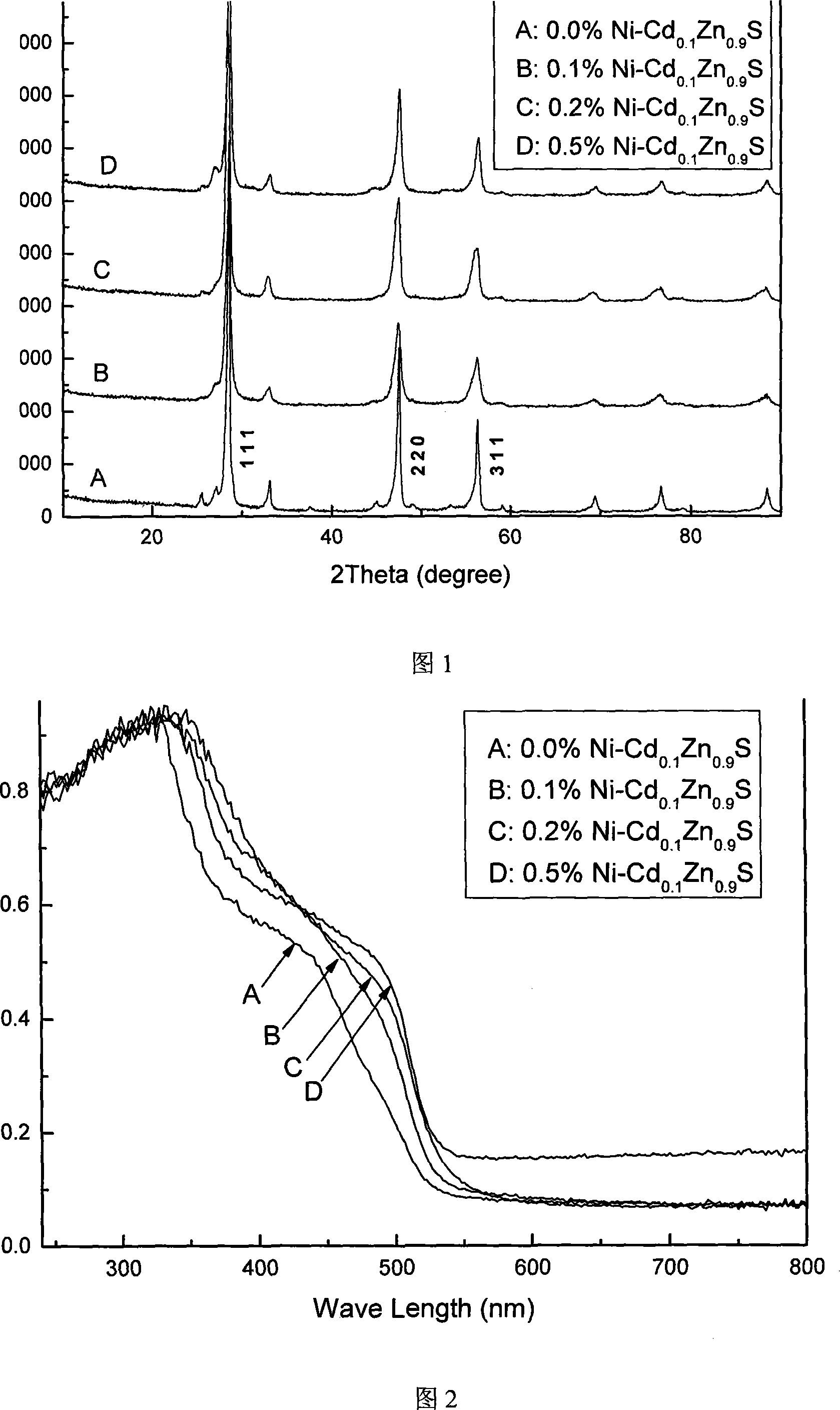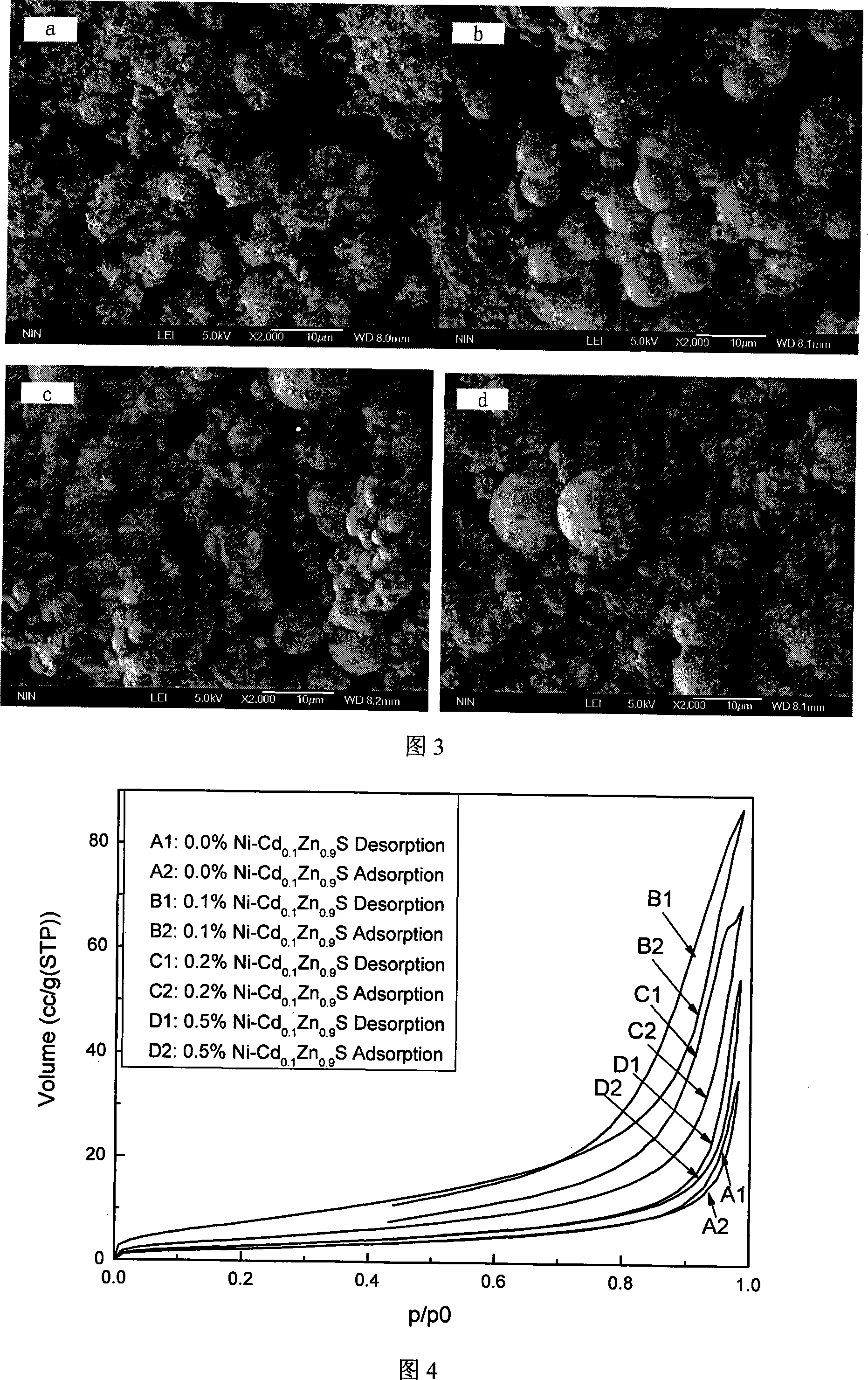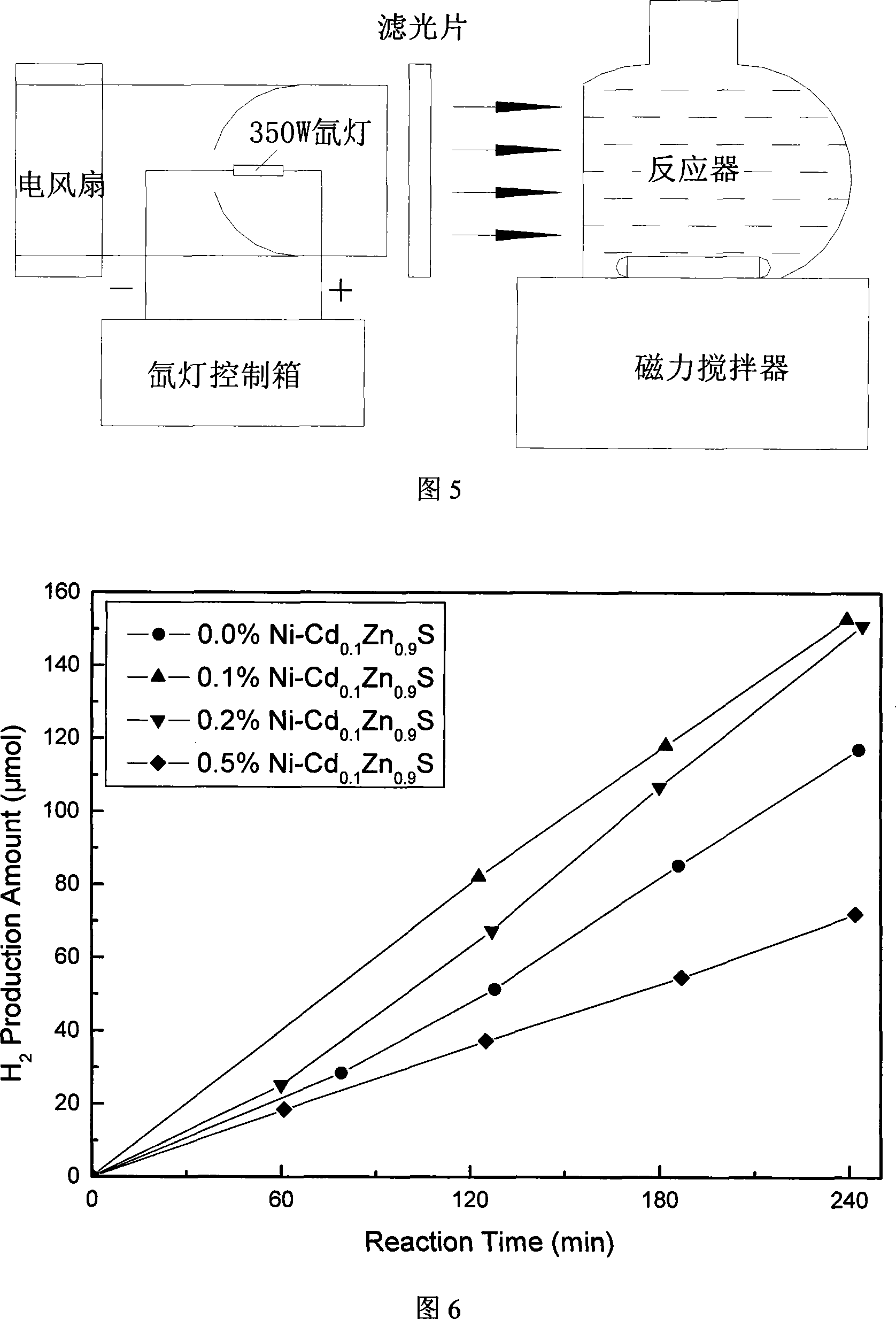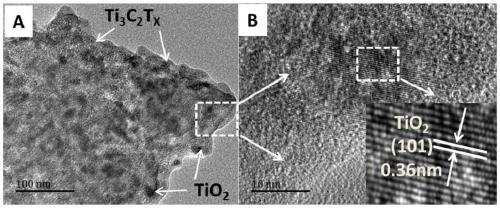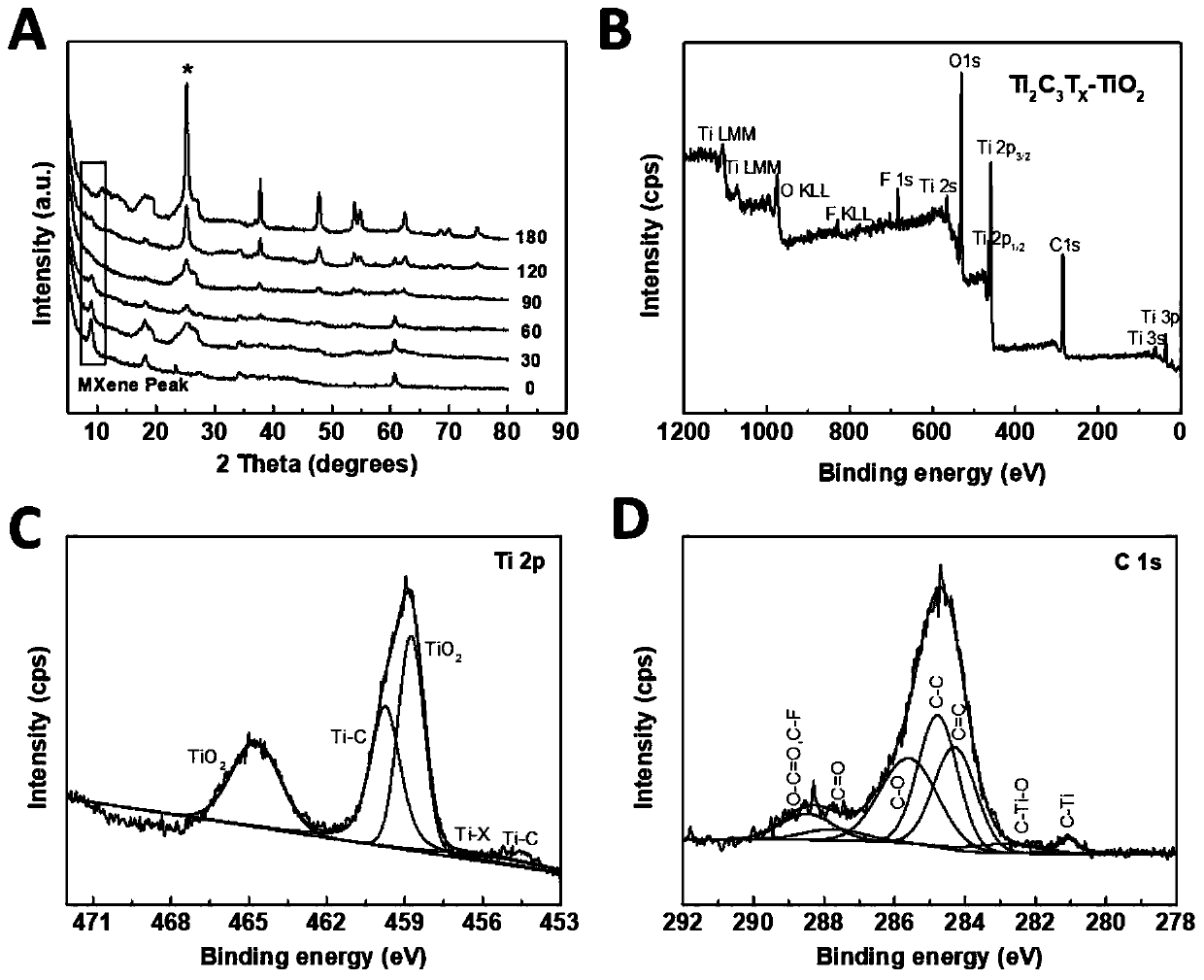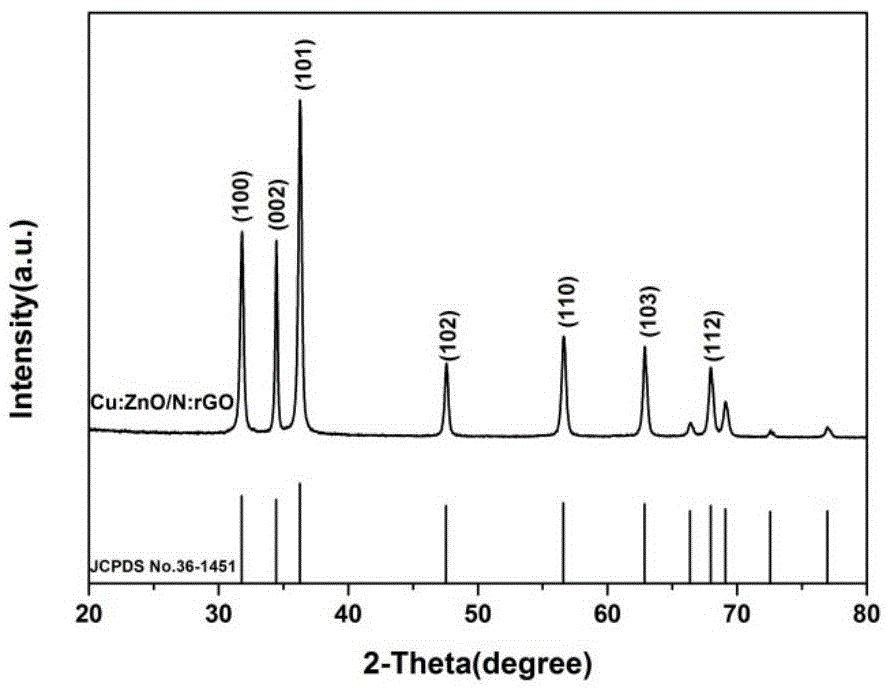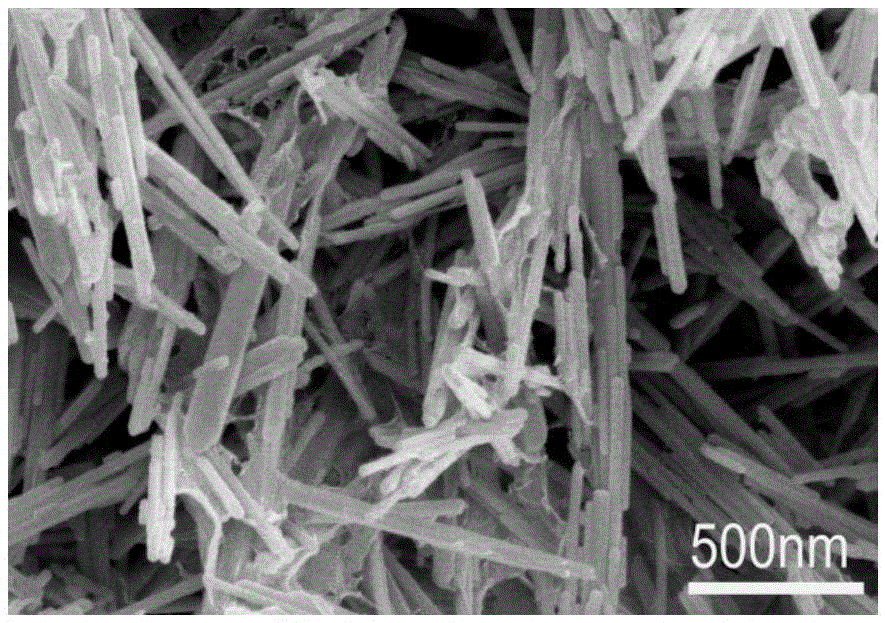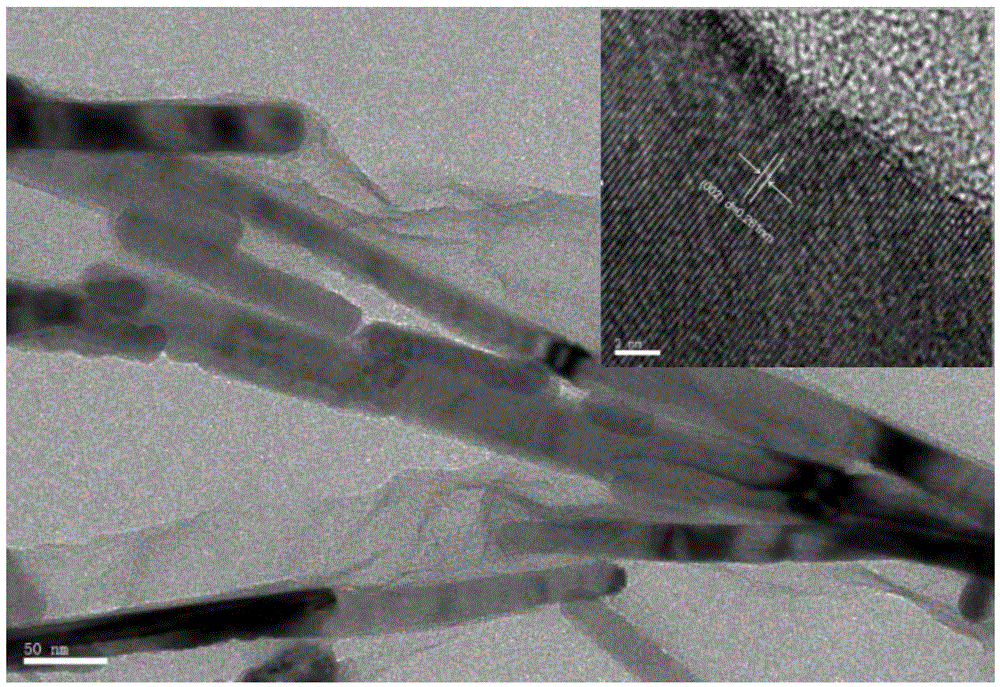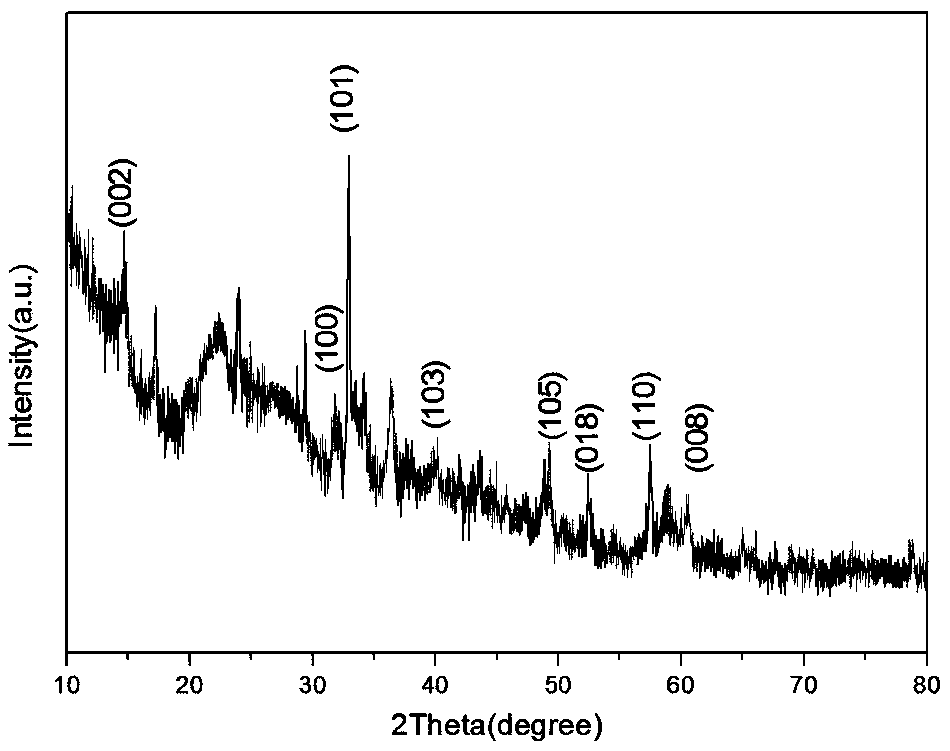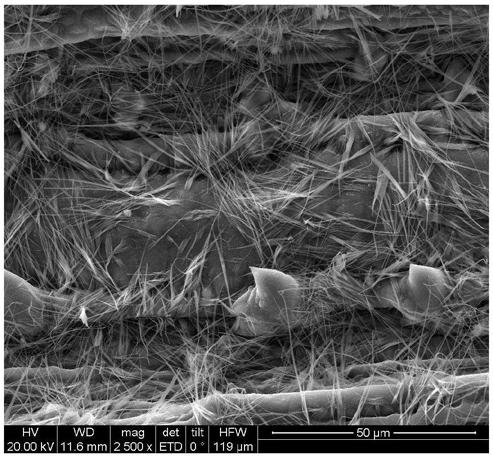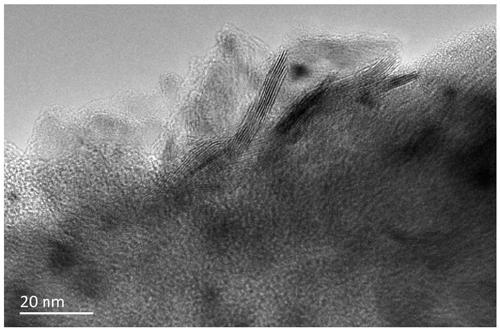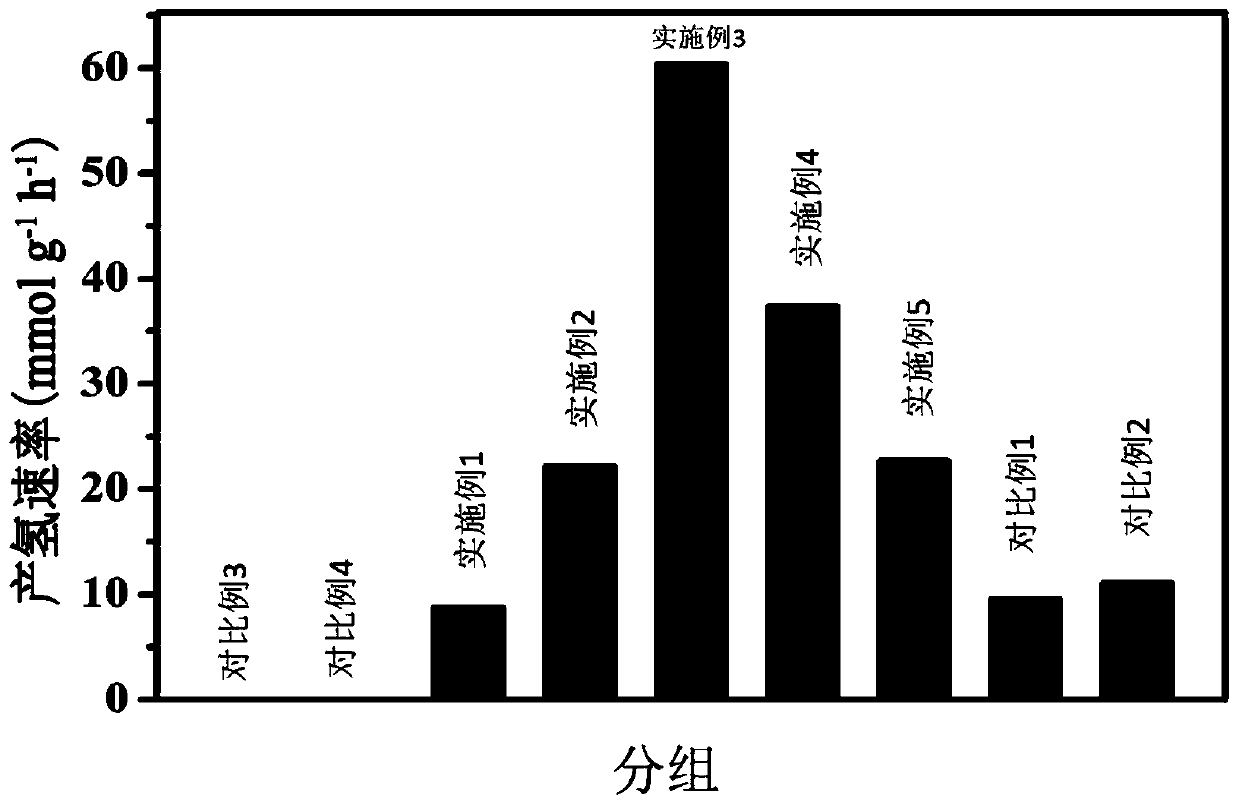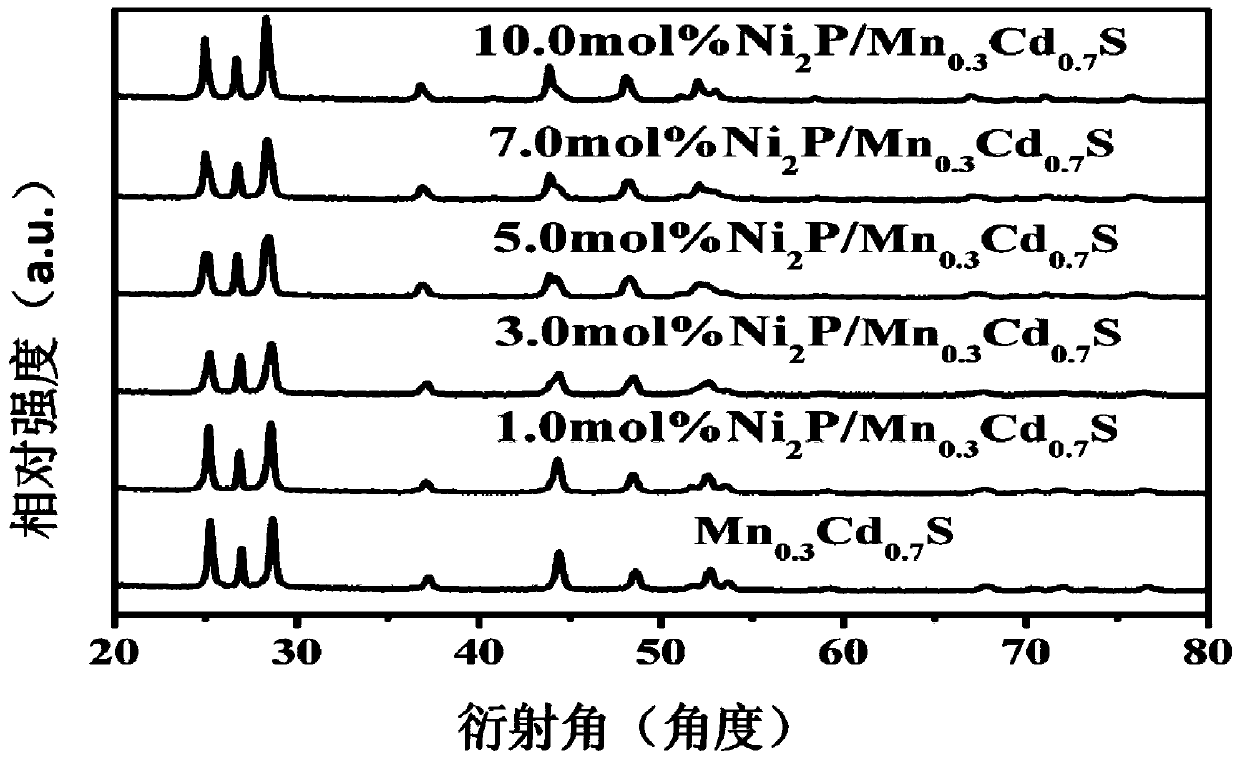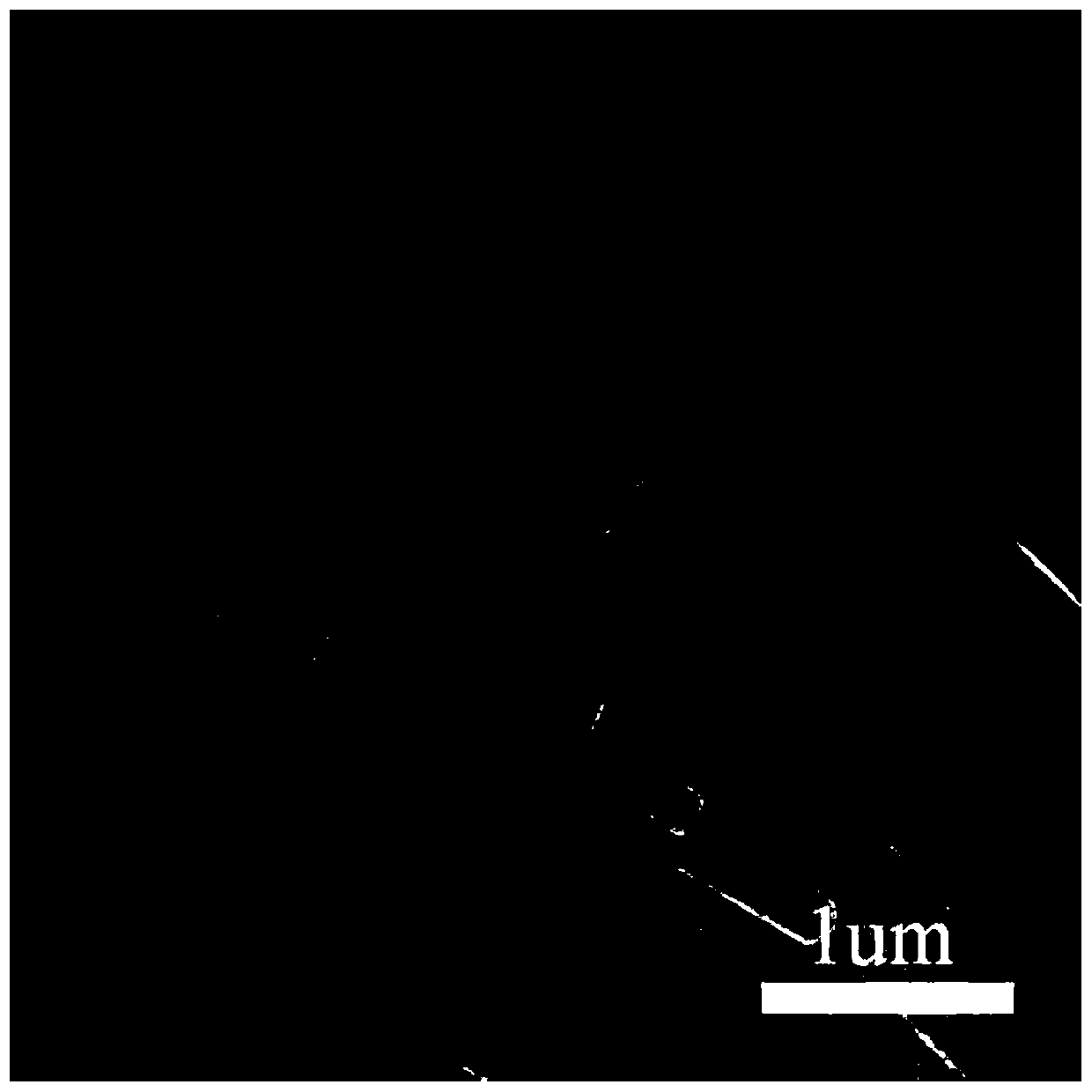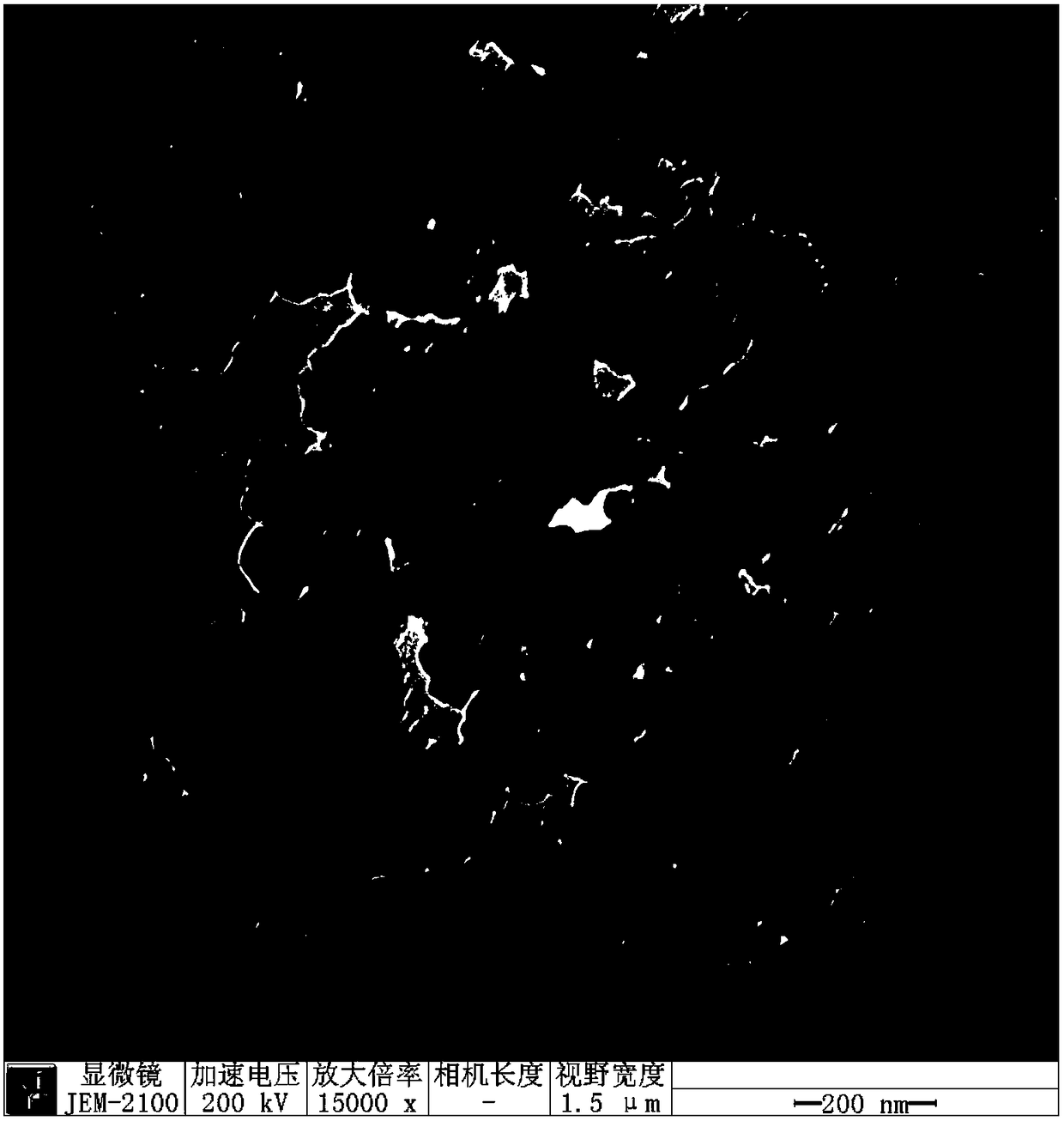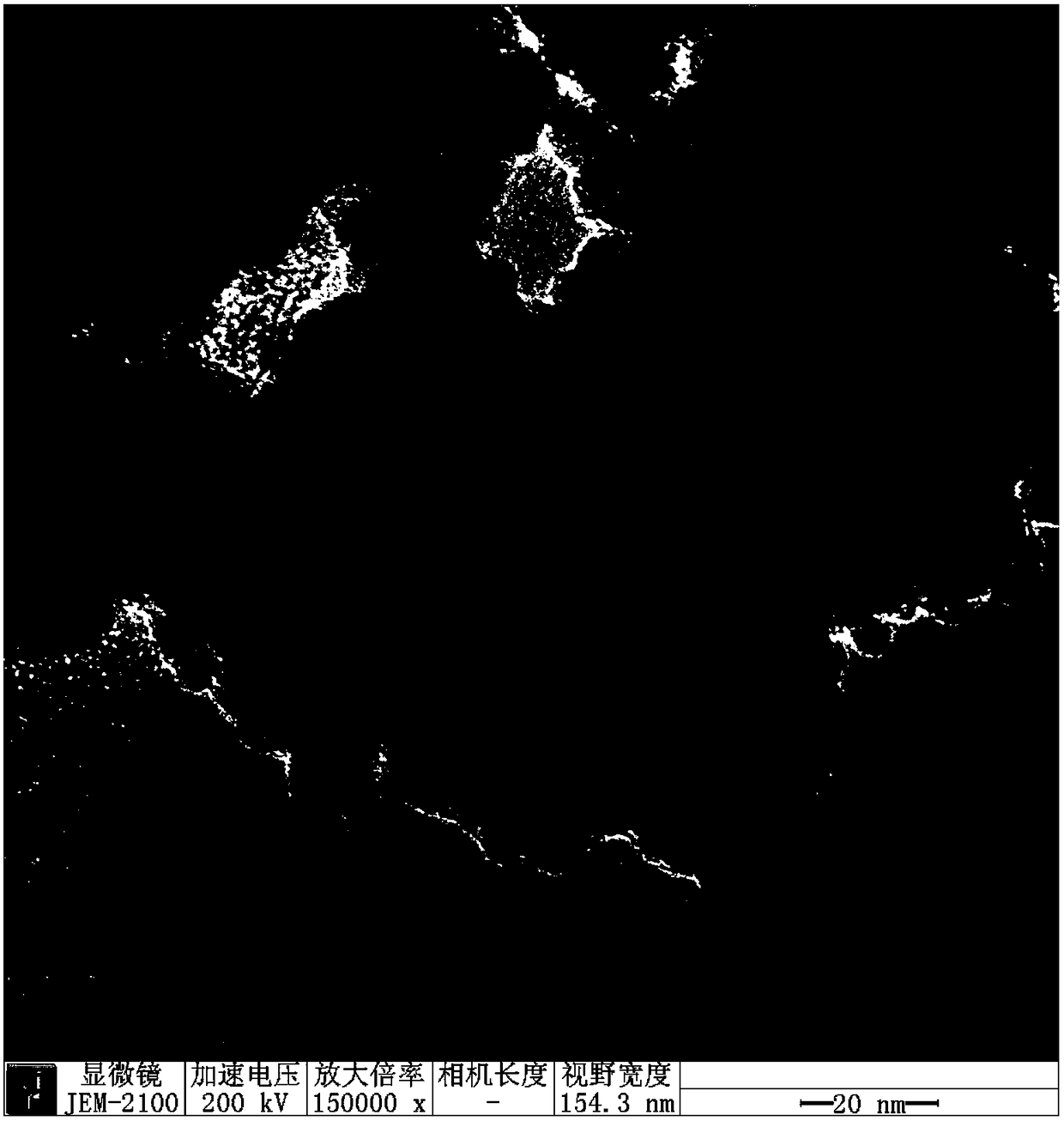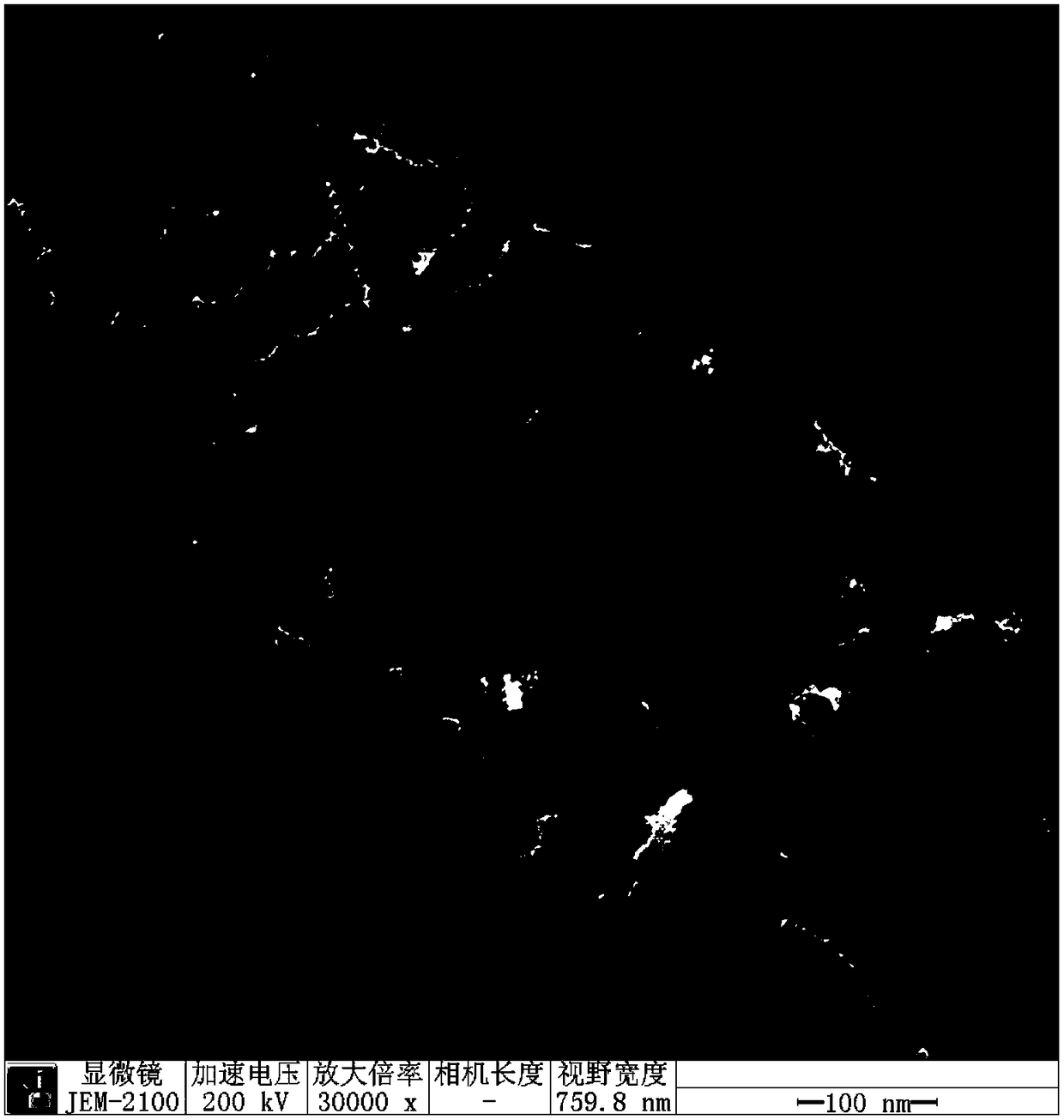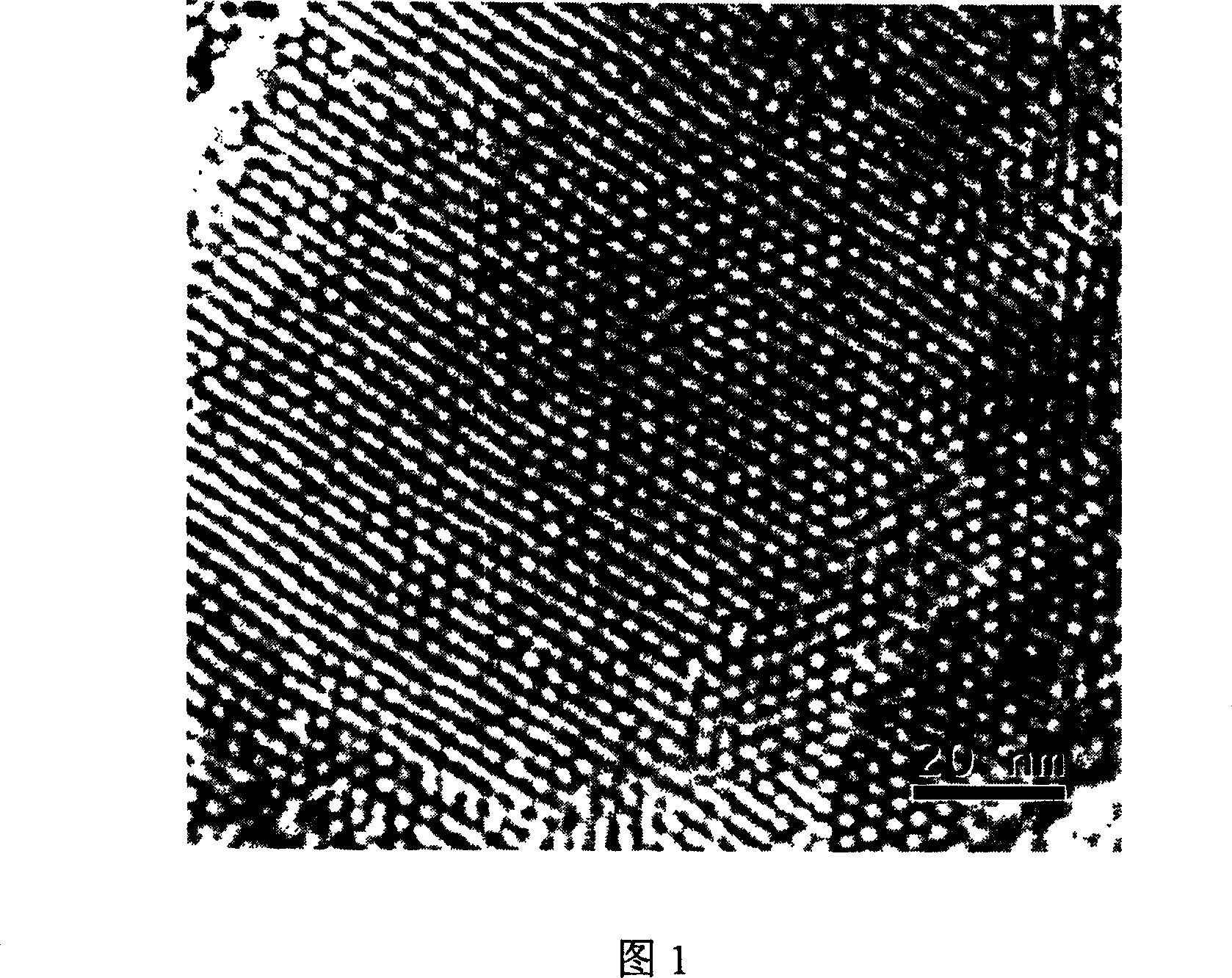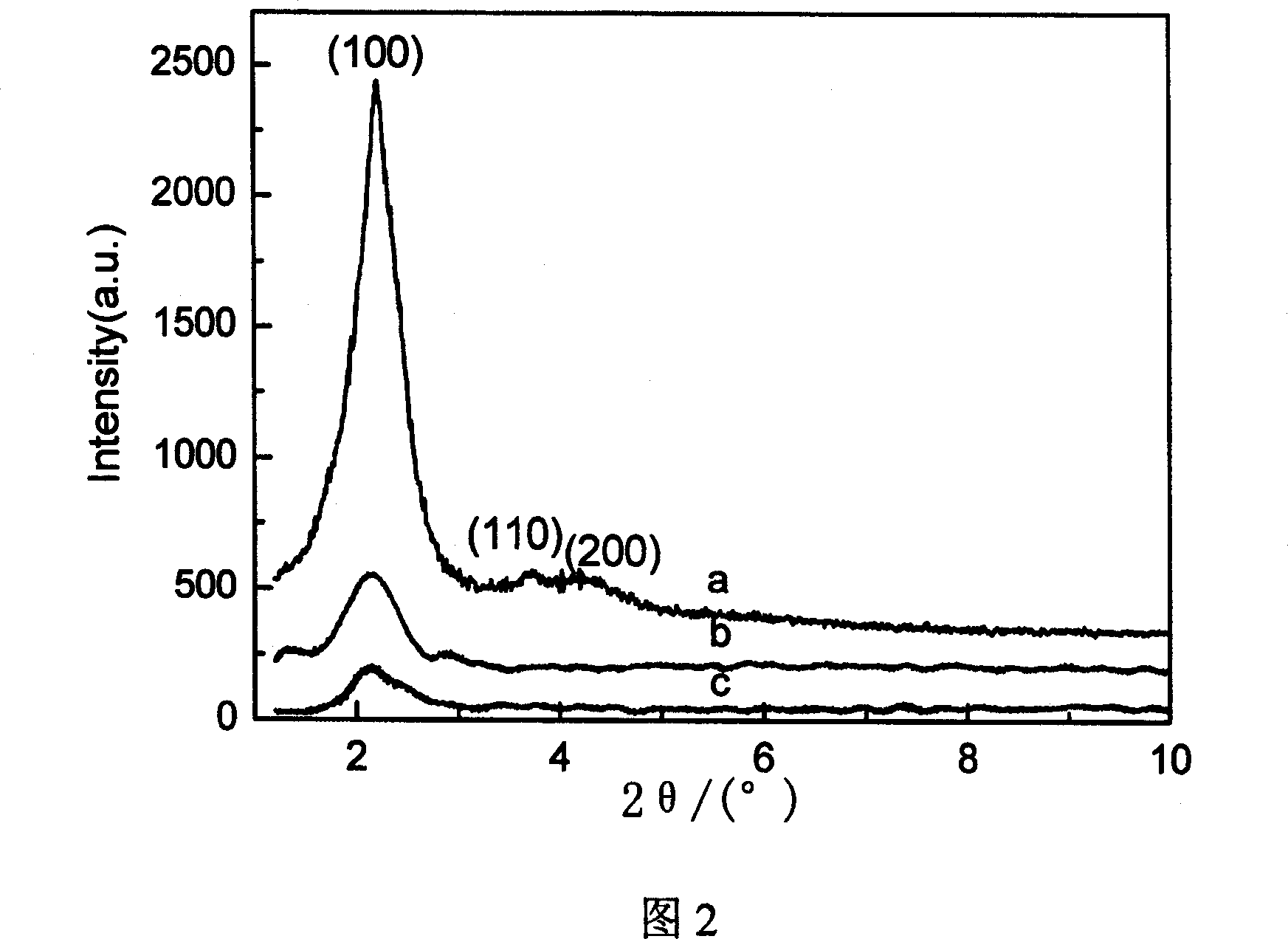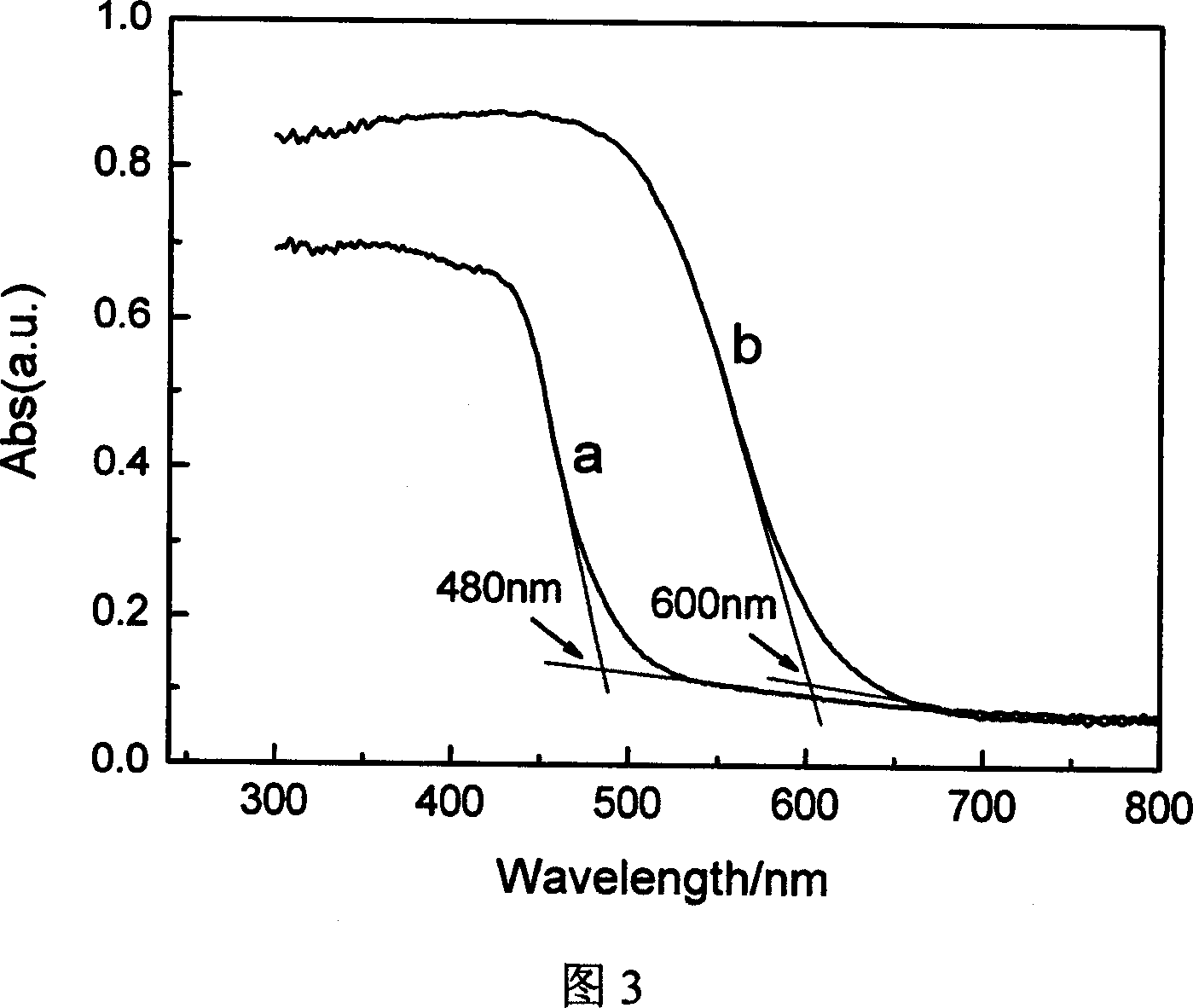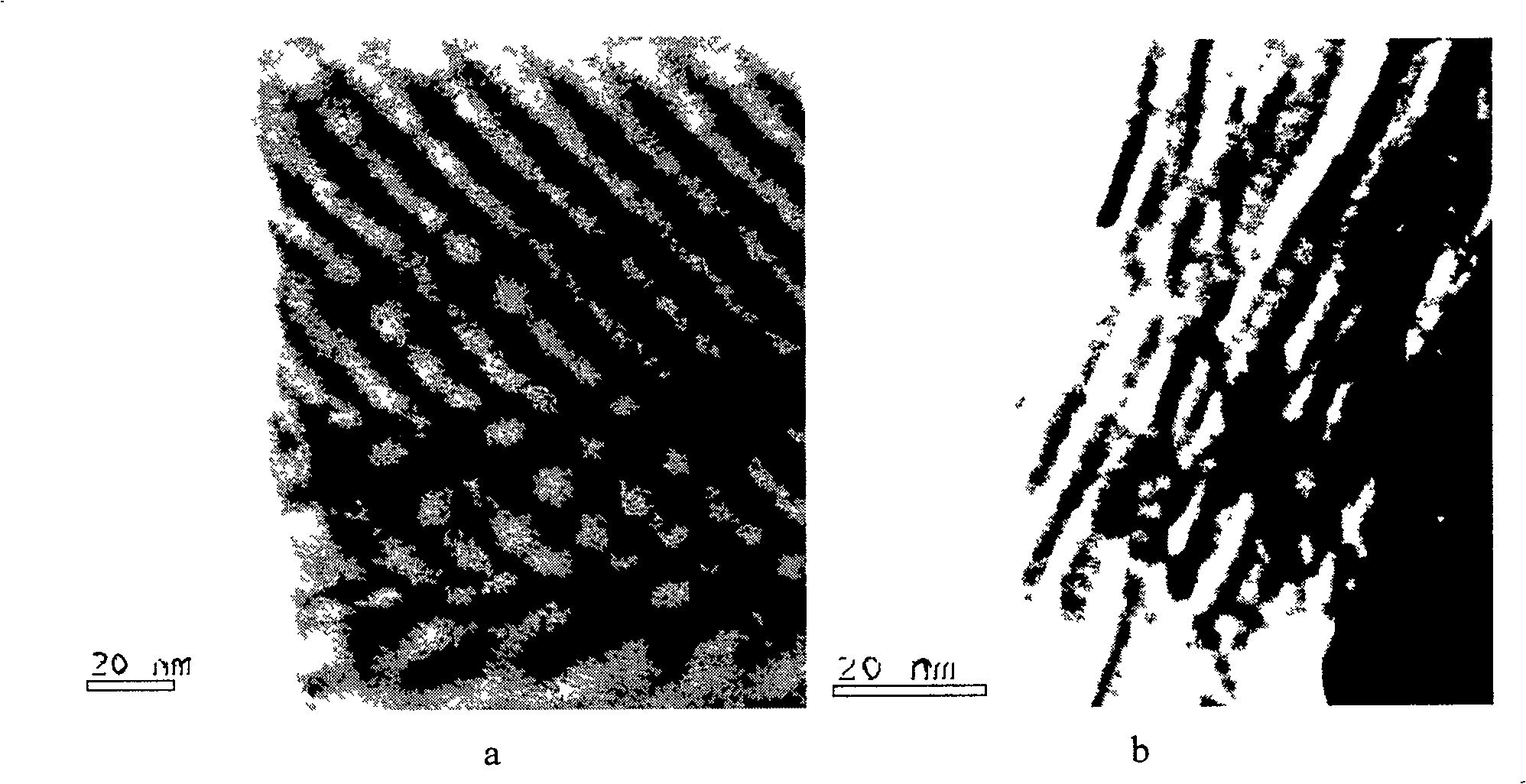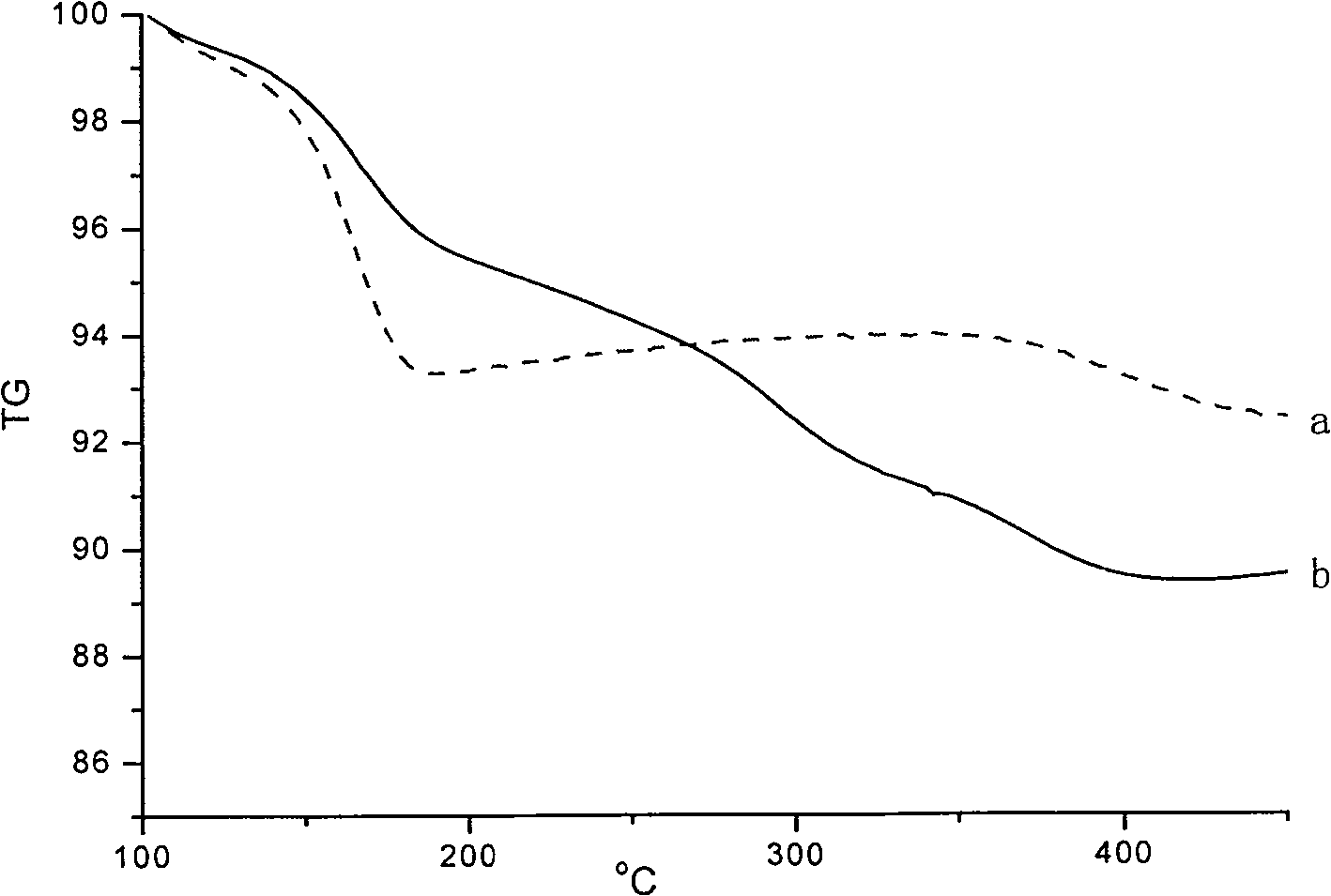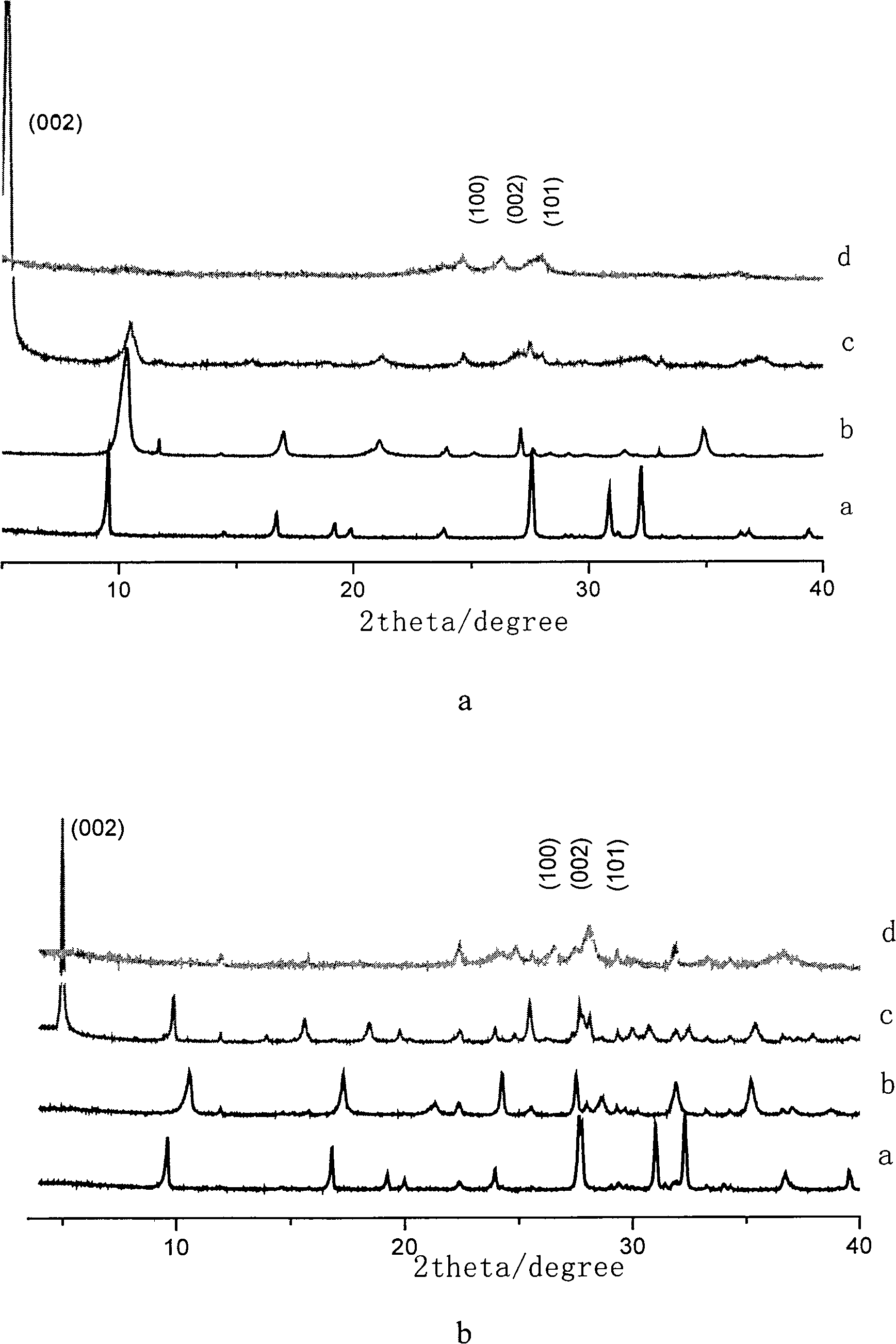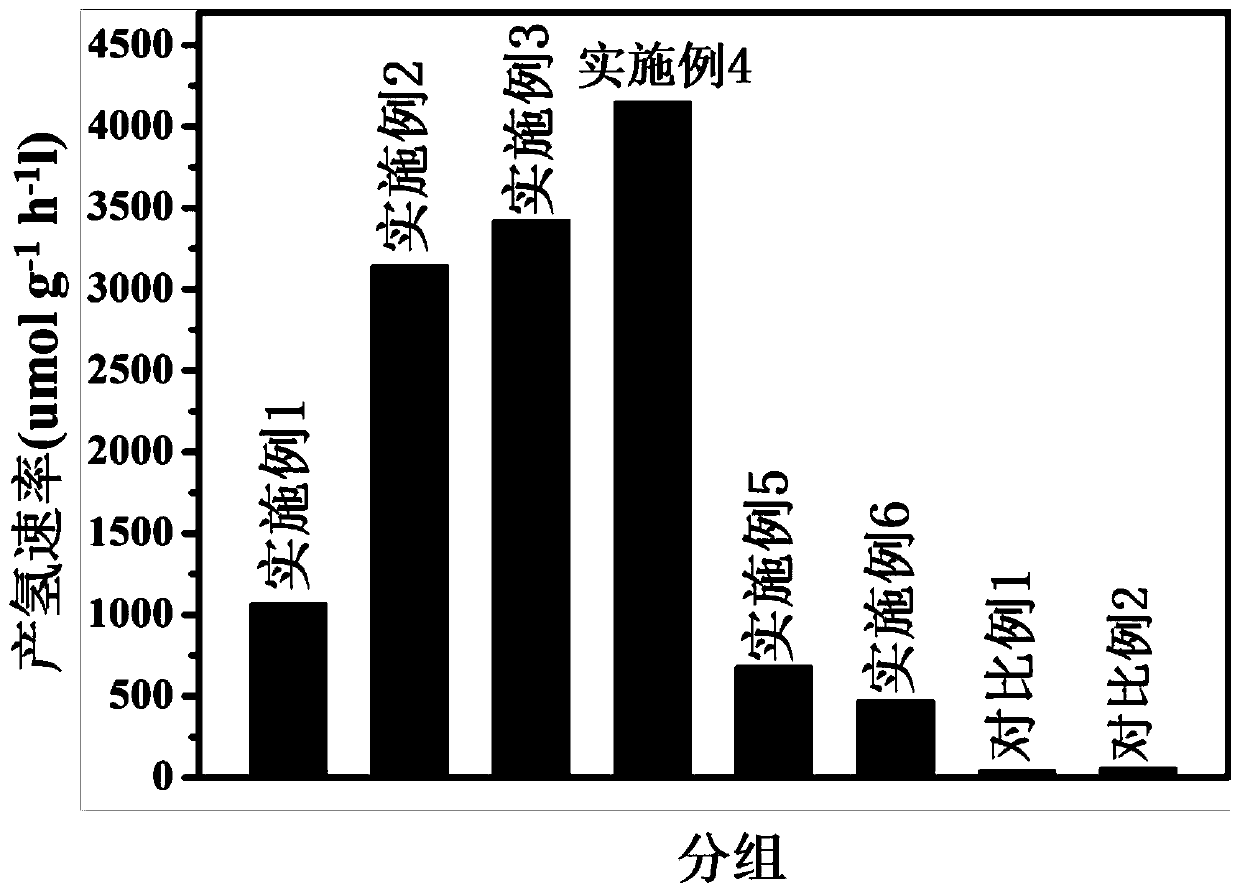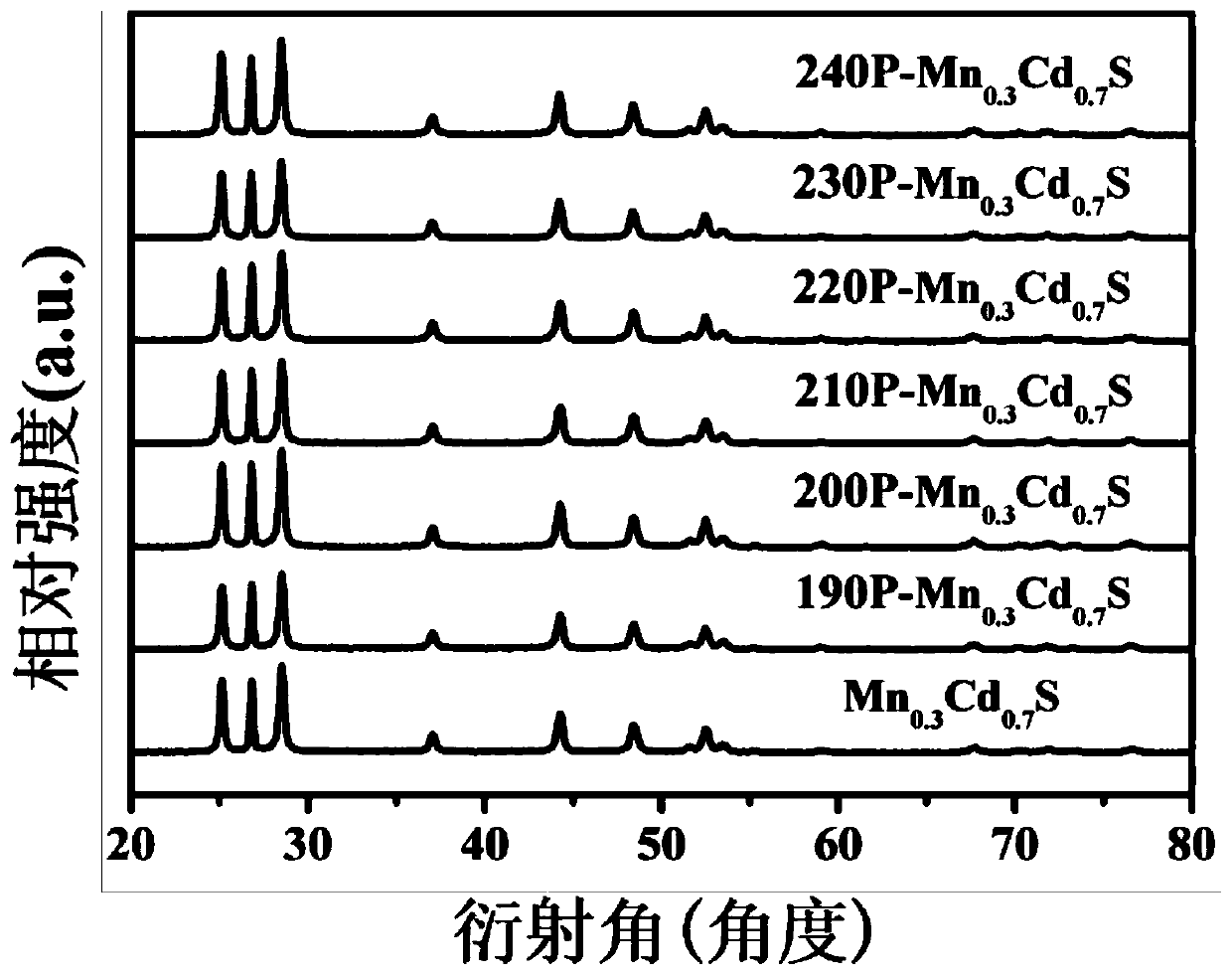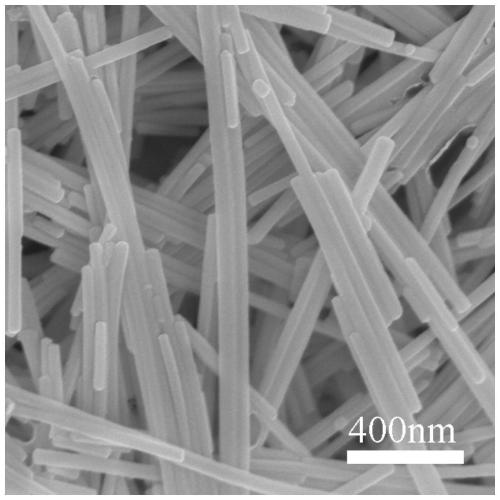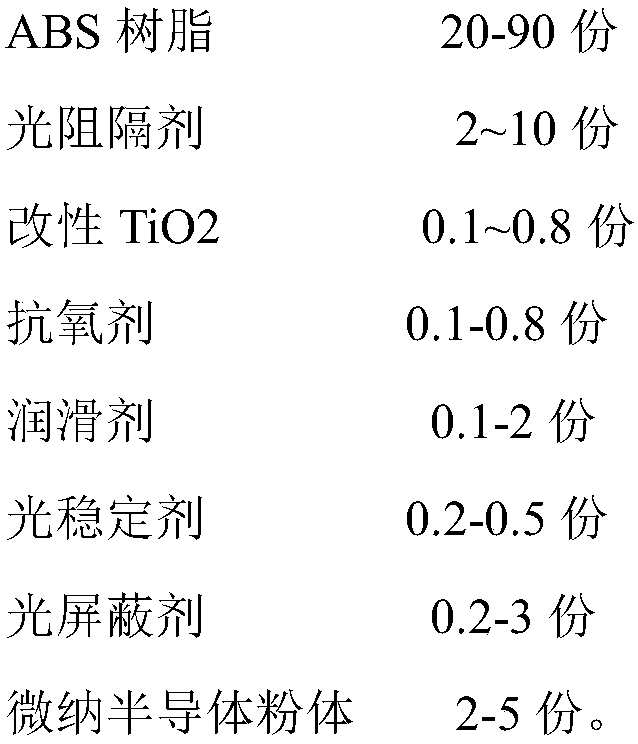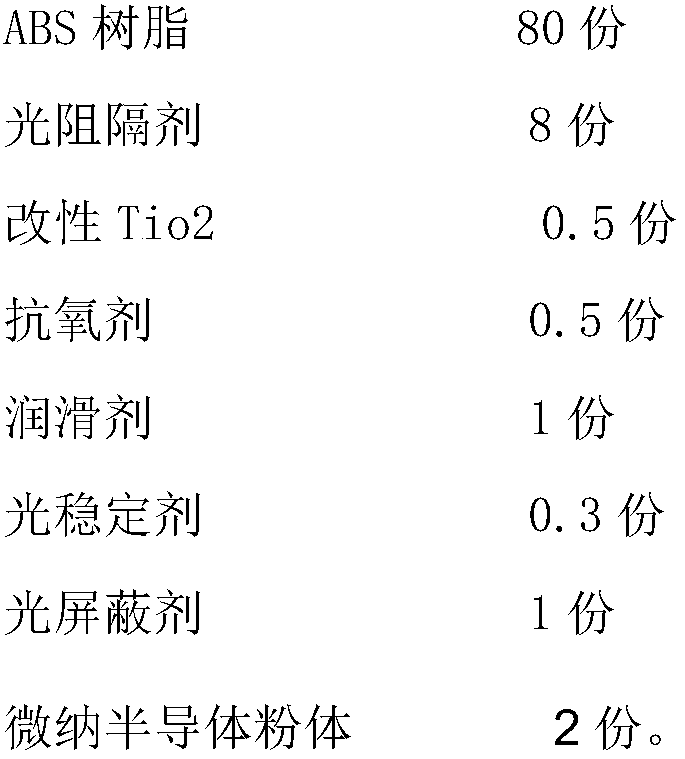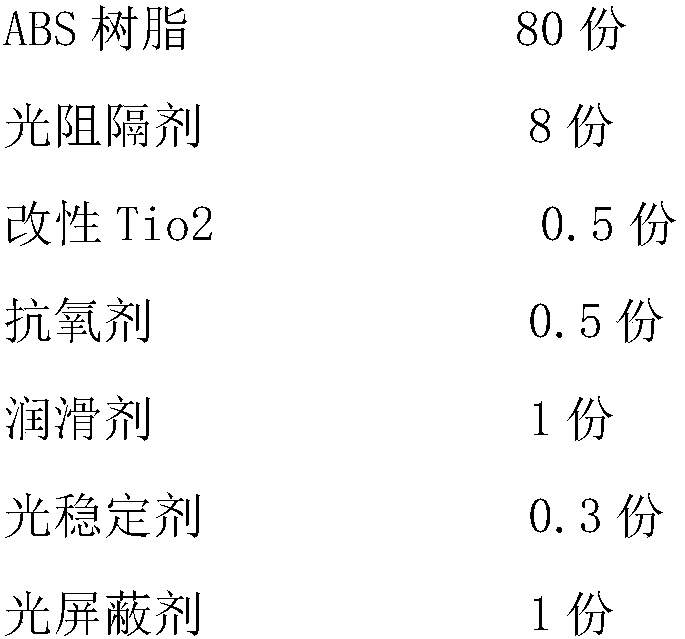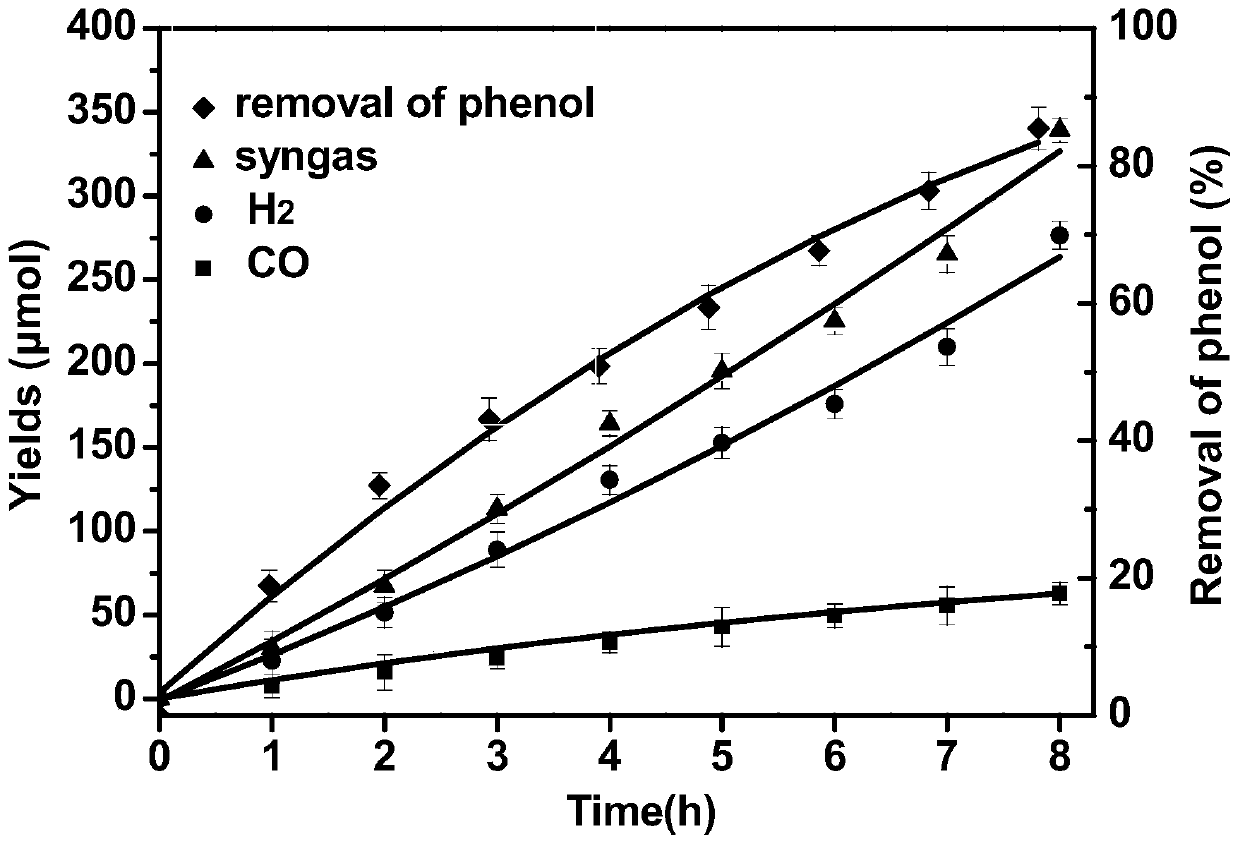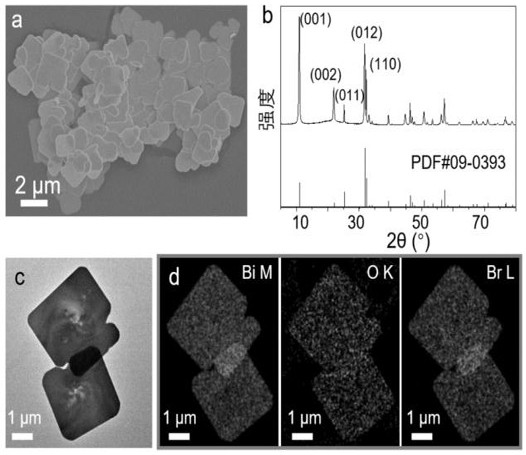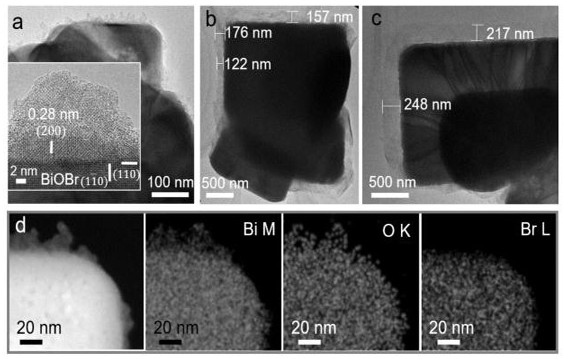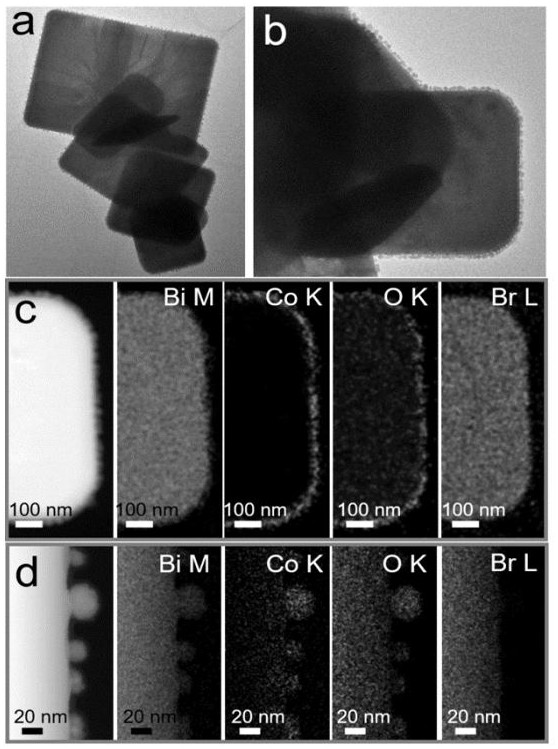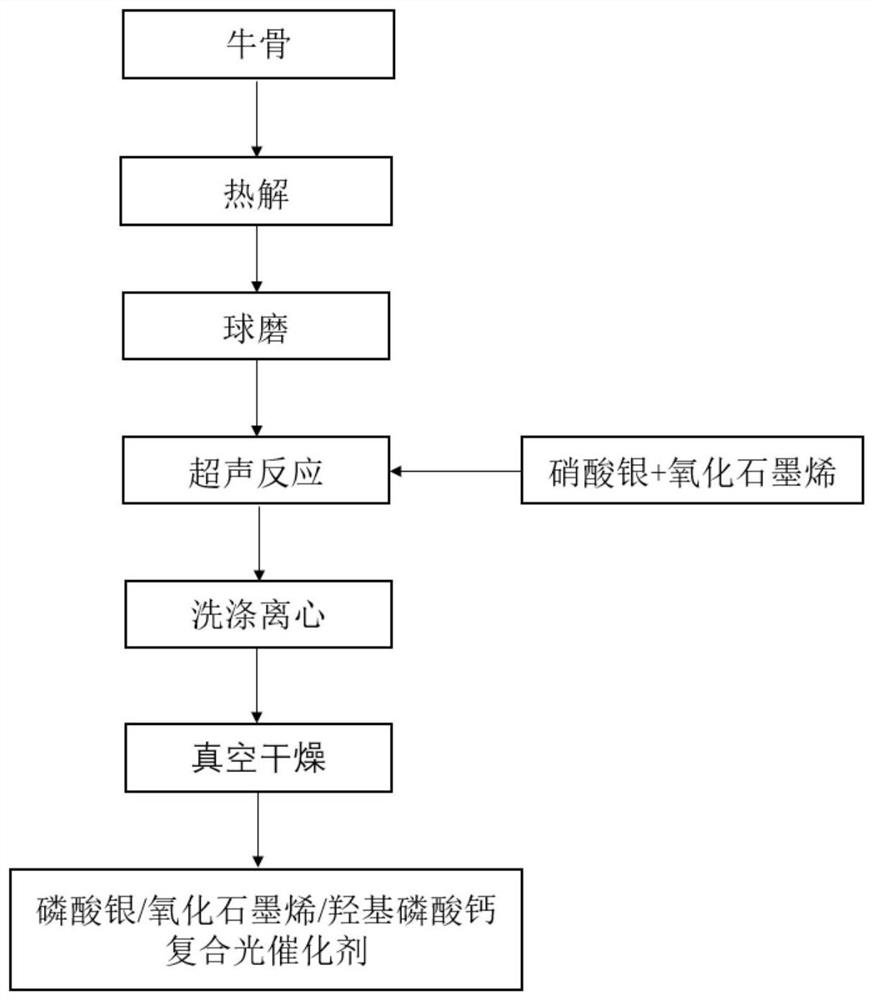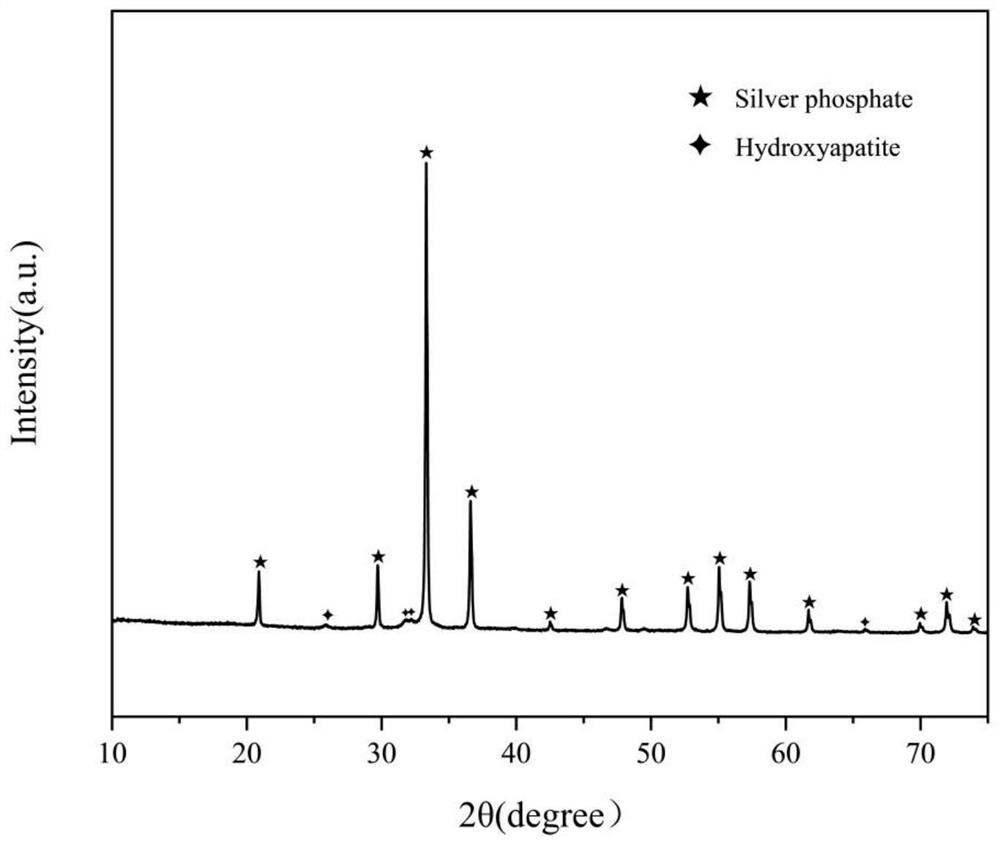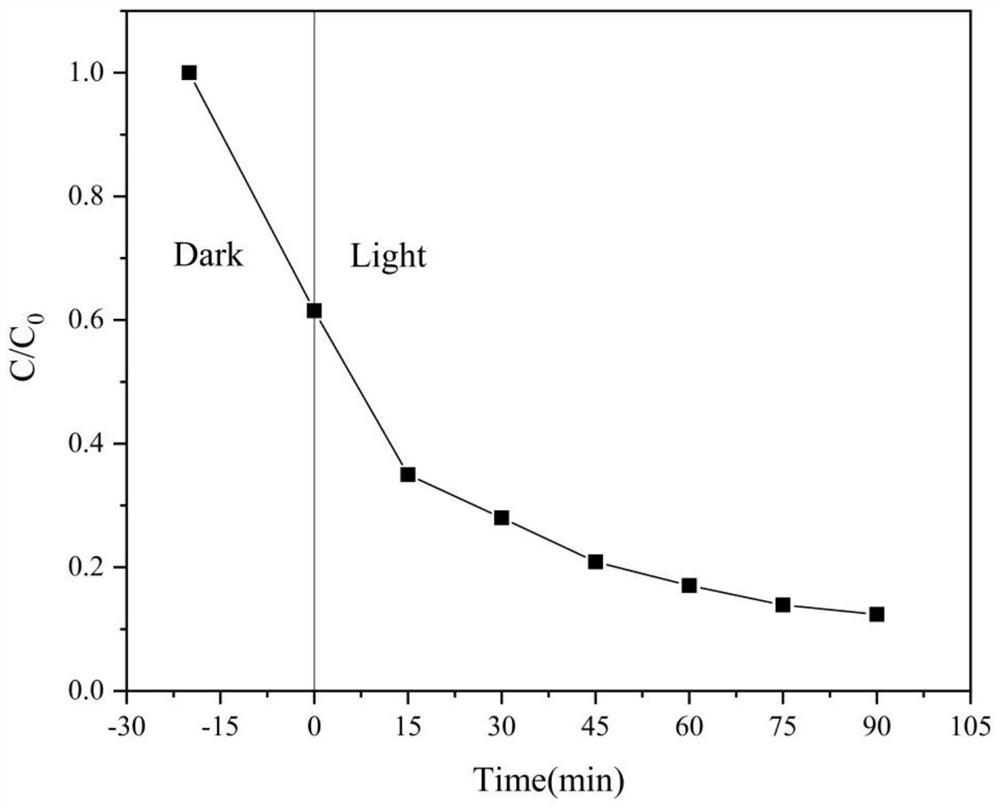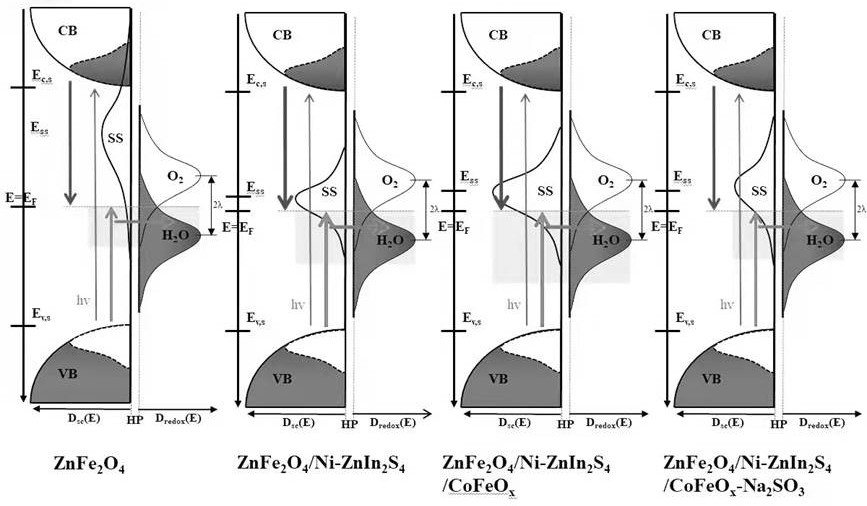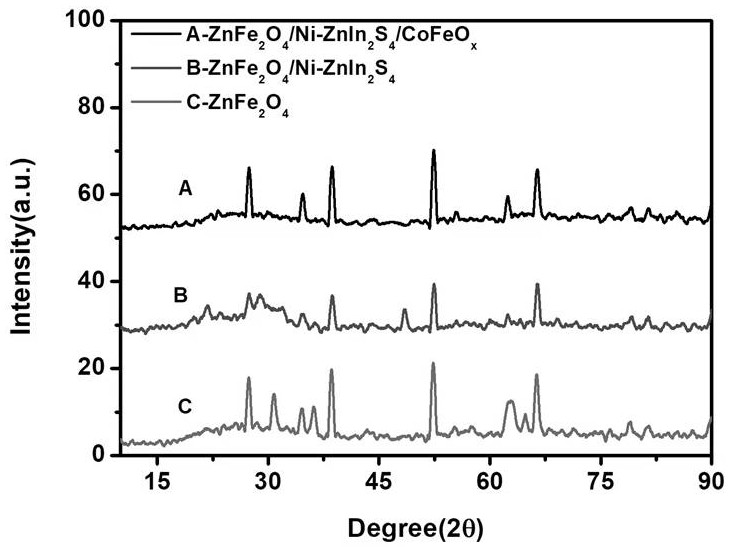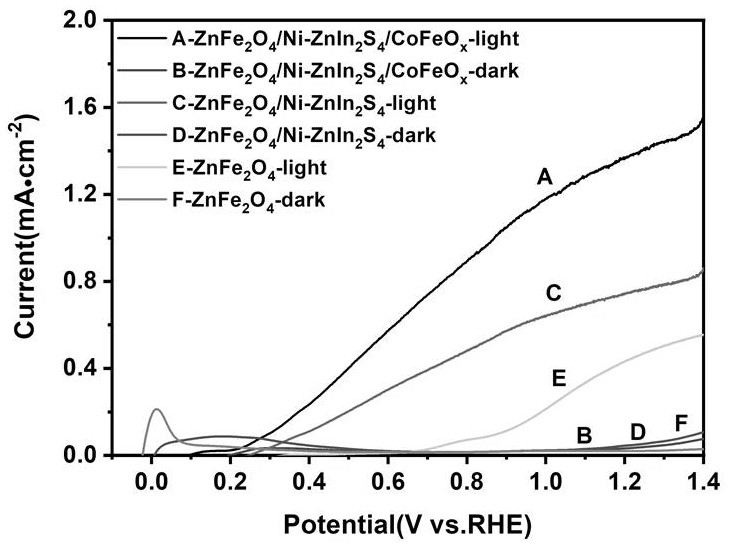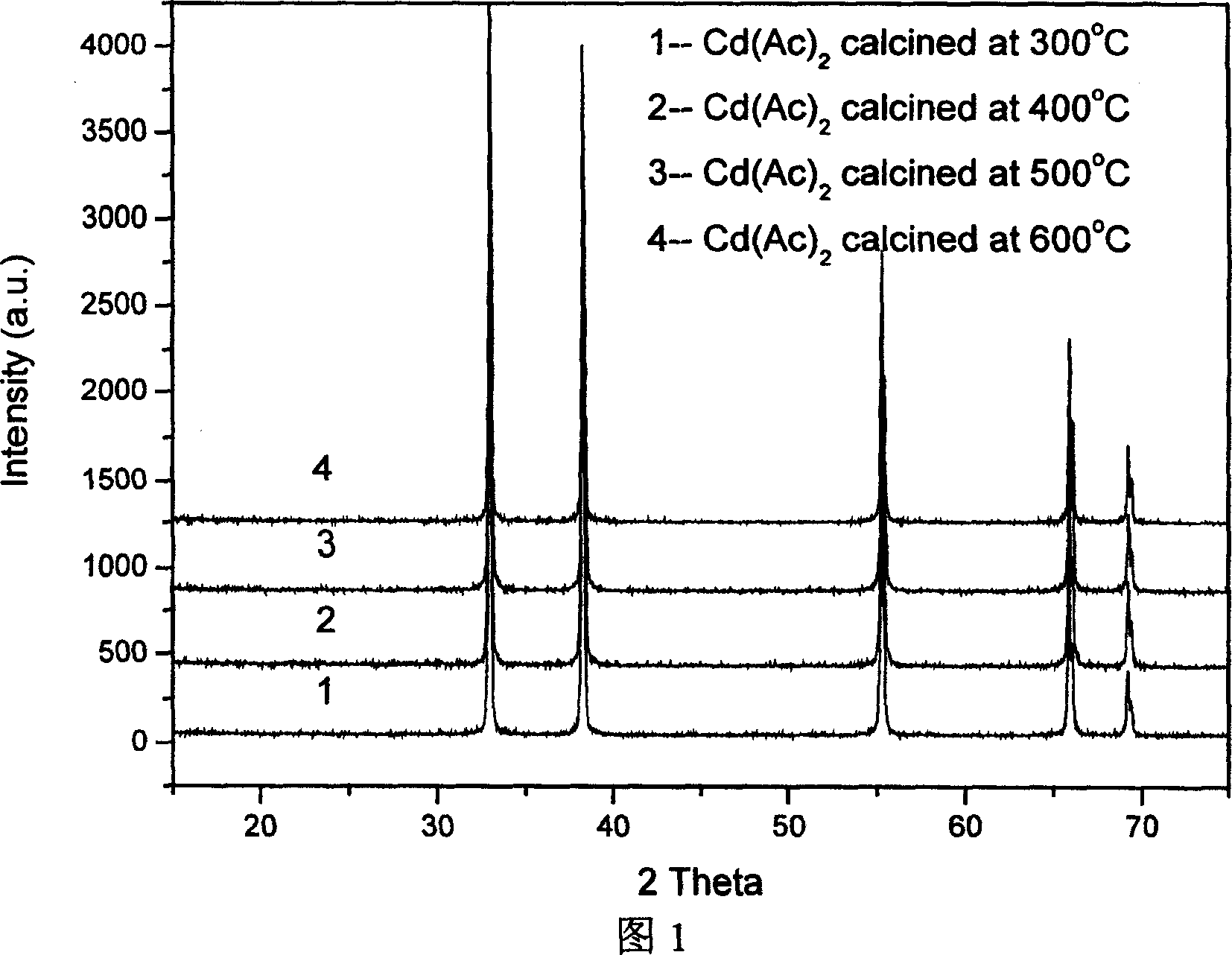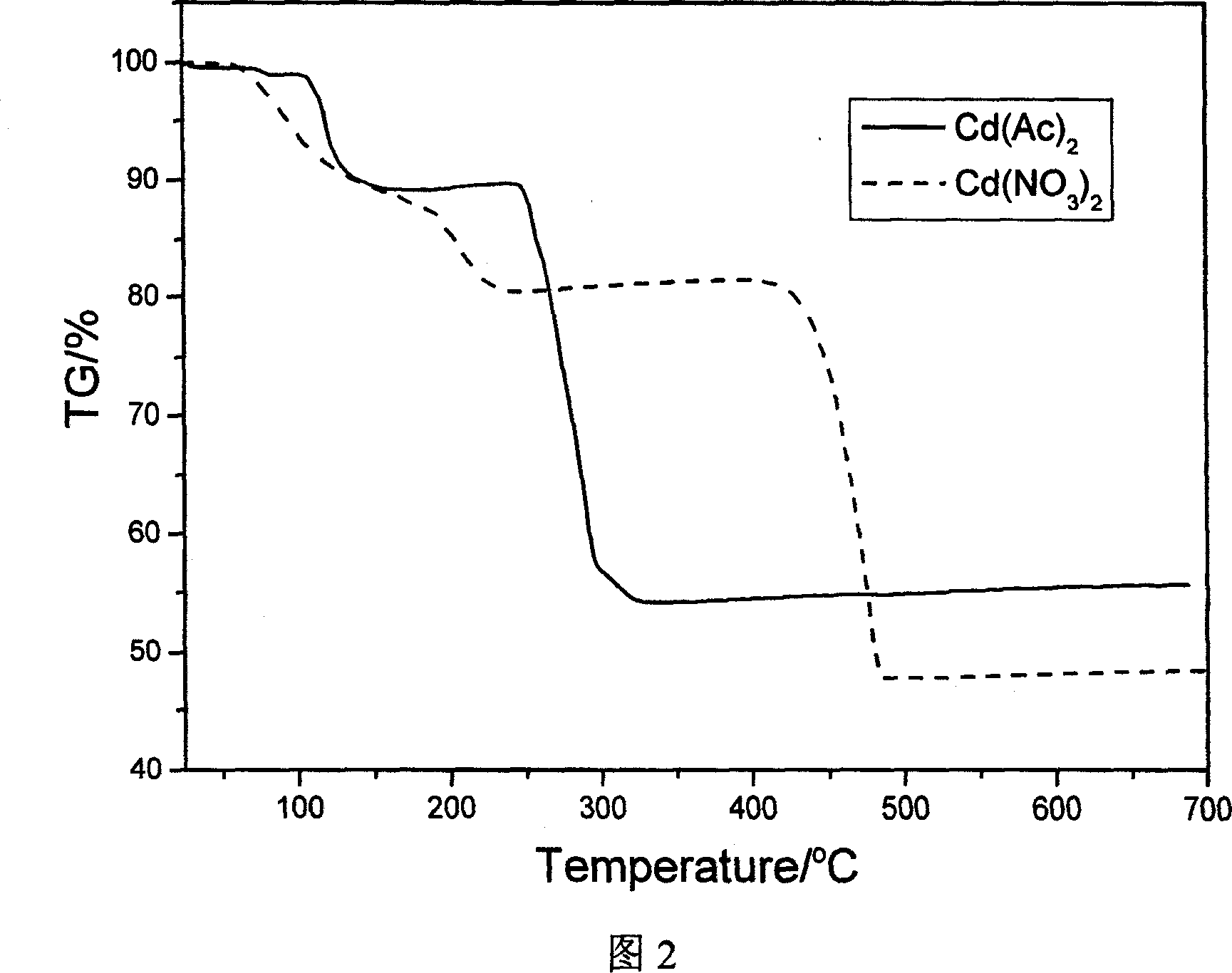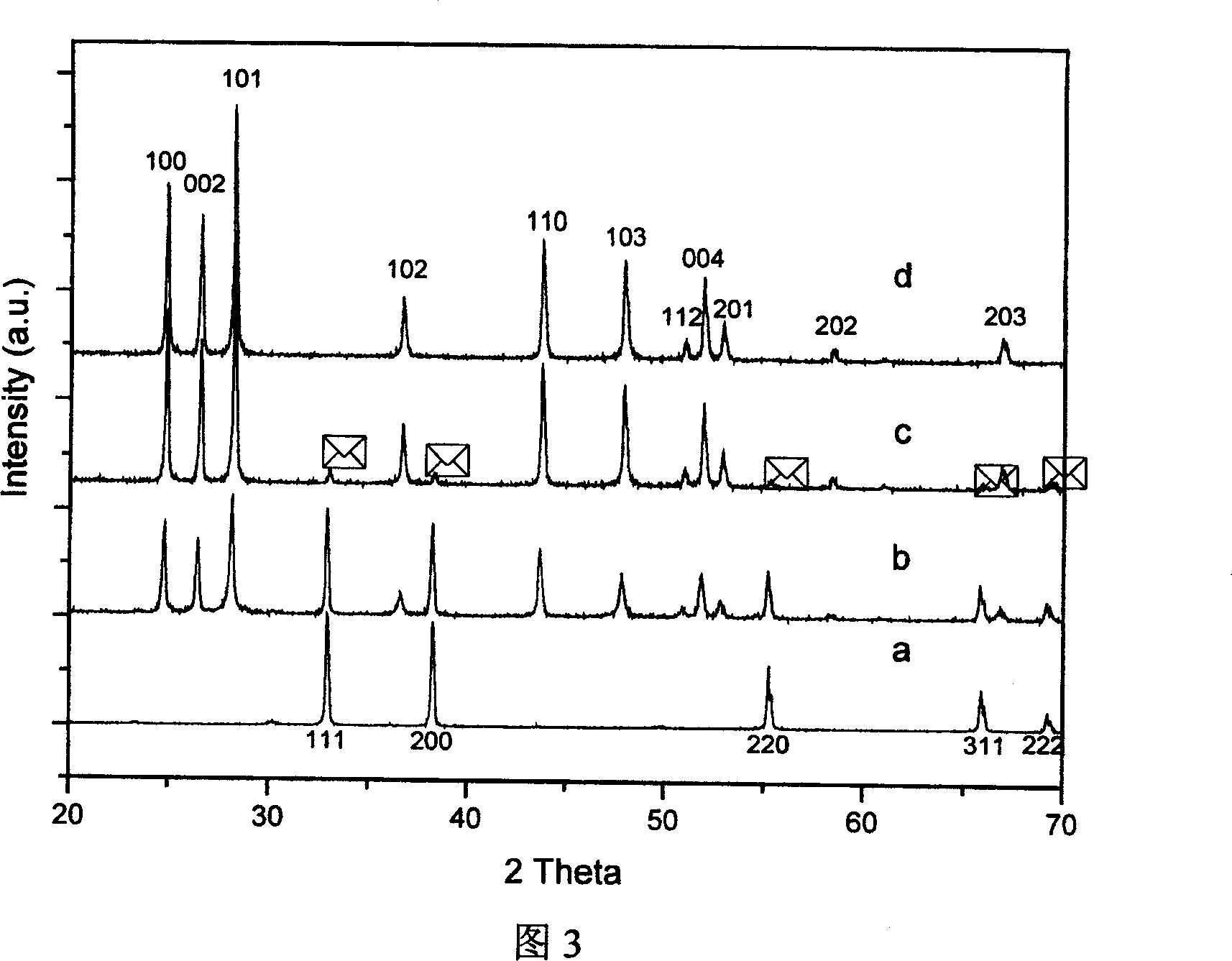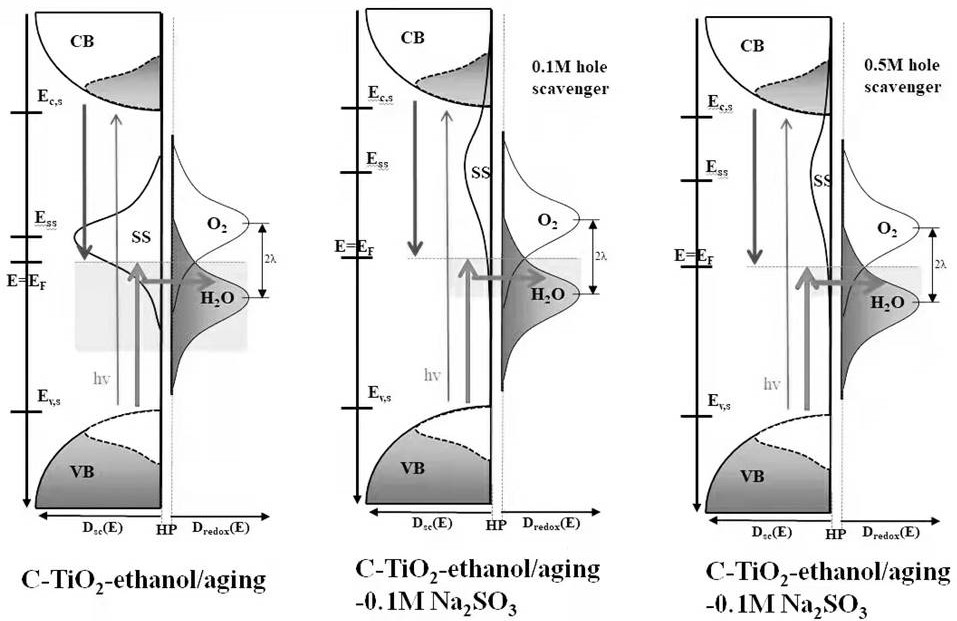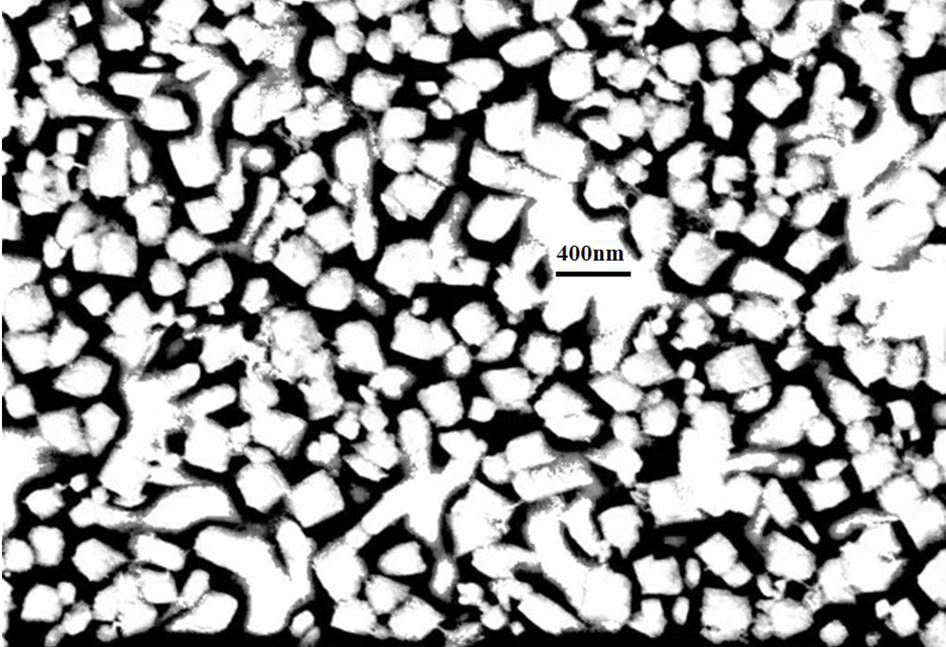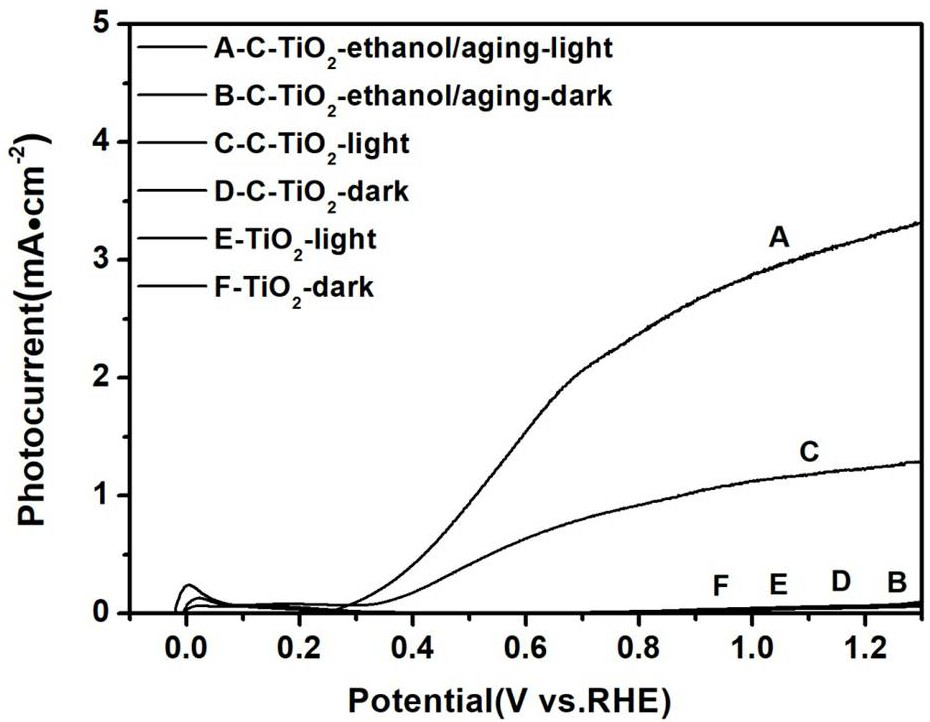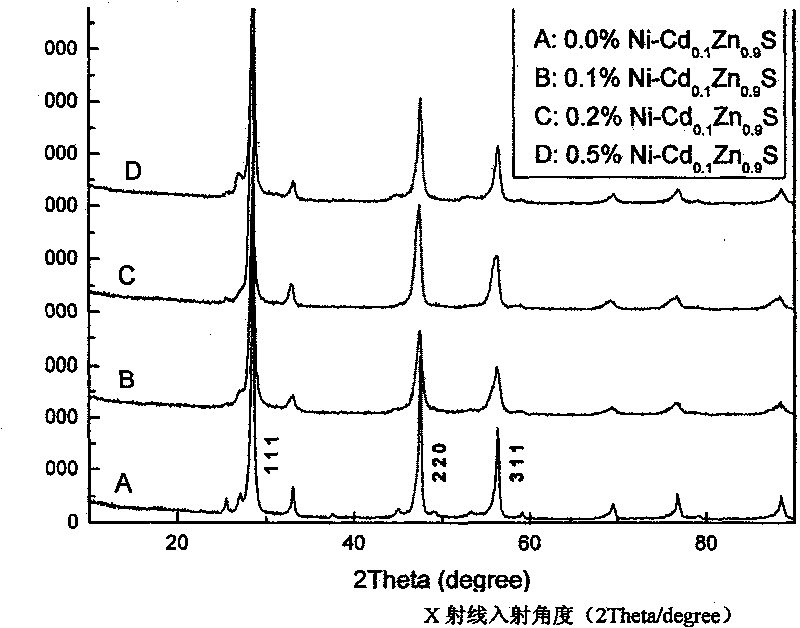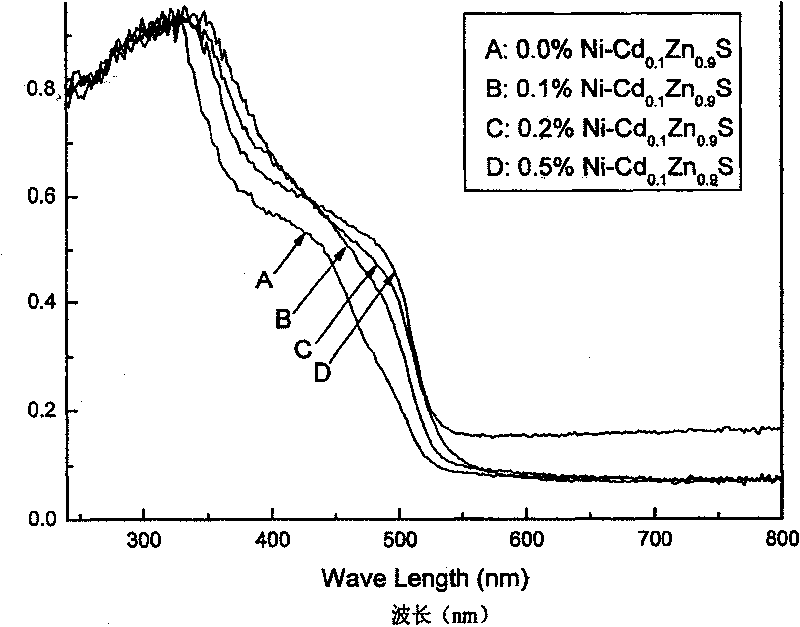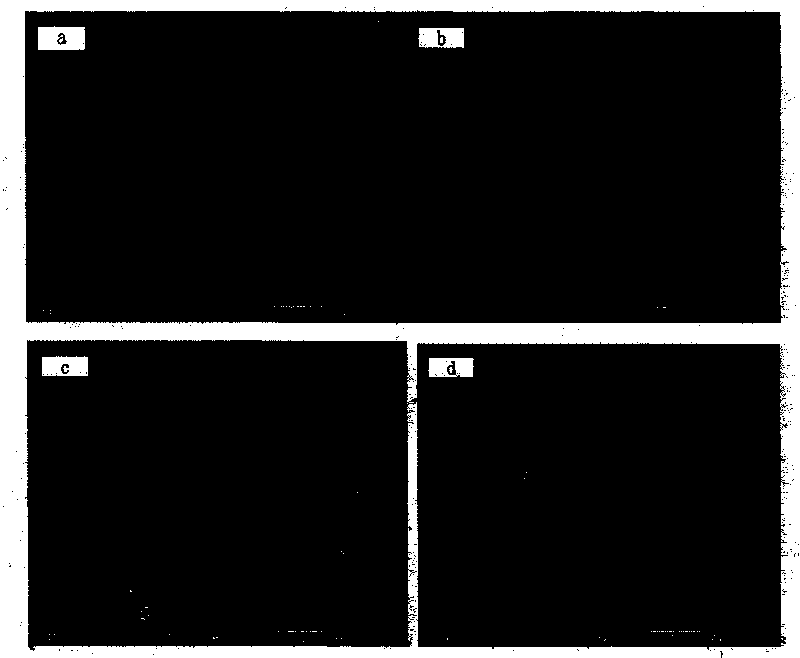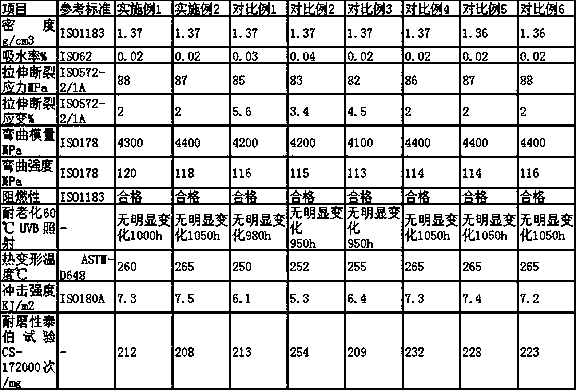Patents
Literature
35results about How to "Improved photocorrosion resistance" patented technology
Efficacy Topic
Property
Owner
Technical Advancement
Application Domain
Technology Topic
Technology Field Word
Patent Country/Region
Patent Type
Patent Status
Application Year
Inventor
Ni doping Cd*.Zn*.*S micrometre ball photocatalyst and preparation method
ActiveCN101157044AImprove hydrogen production activityHigh activityPhysical/chemical process catalystsHydrogen productionPhotocatalytic water splittingPhotocatalytic reaction
The invention discloses Ni-doped Cd0.1Zn0.9 S microsphere photocatalyst and the preparation method thereof, the particle shape of the produced photocatalyst is a microsphere formed by nanometer crystals, and the doping amount of Ni is 0.1 percent to 0.5 percent of the weight of the catalyst. The invention has the preparation method that zinc sulfate, cadmium sulfate, nickel nitrate, and thioacetamide are taken as raw materials to form mixed solution which is sealed in a hydrothermal caldron and then laid in a baking oven to be insulated, naturally cooled to the room temperature, a resultant is obtained through cleaning, drying, and grinding. The Ni-doped Cd0.1Zn0.9S microsphere photocatalyst is prepared by the invention, and the anti-surface oxidation capability in air and the photo-corrosion resistant capability in the photocatalytic reaction are evenly enhanced greatly. Because the particle of the photocatalyst is microsphere-shaped, the photocatalytic activity for photocatalytic water splitting into hydrogen of visible light of the catalyst is greatly enhanced, and the highest hydrogen production rate reaches 191.01 micromole / (g*h). The quantum efficiency reaches 6.77 percent at the 420 nm position. After Pt of 0.6 wt percent is loaded, the highest hydrogen production rate reaches 585.45 micromole / (g*h), which is three times than the hydrogen production rate when the Pt is not loaded. The quantum efficiency reaches 15.9 percent at the 420 nm position, the activity is high, and the stability is good.
Owner:XI AN JIAOTONG UNIV
Ti3C2Tx-TiO2 composite material as well as preparation method and application thereof
InactiveCN111482188AImprove photoelectric responseGood photocurrent responsePhysical/chemical process catalystsOxy/sulfo carbidesPhotocurrentPhotoelectric sensor
The invention belongs to the field of photoelectric materials, and discloses a Ti3C2Tx-TiO2 composite material and a preparation method and application thereof. The preparation method comprises the following steps: dispersing layered Ti3C2Tx Mxene powder into water and stirring, then adding a hydrogen peroxide solution, and carrying out a stirring reaction for 1-3 h at the temperature of 80-120 DEG C; and then carrying out ultrasonic treatment on the mixed solution after the reaction, washing and drying to obtain the Ti3C2Tx-TiO2 composite material. The mass volume ratio of the layered Ti3C2TxMxene powder to H2O2 is 1:(0.3-0.9) g / mL. According to the invention, the composite material with high photoelectric response is obtained by controlling the oxidation degree of Ti3C2Tx. The compositematerial has good photocurrent response and excellent stability and photocorrosion resistance, and can be used for preparing detection chips or sensors. The photoelectric sensor prepared by the method has excellent stability and repeatability.
Owner:GUANGZHOU UNIVERSITY
Hydrophobic bacteriostasis multifunctional coated cloth and processing method thereof
InactiveCN106012496APlay a shielding roleImproved photocorrosion resistanceBiochemical fibre treatmentLight resistant fibresParaffin waxFiber
The invention relates to a coated cloth and especially relates to a hydrophobic bacteriostasis multifunctional coated cloth and a processing method thereof. The hydrophobic bacteriostasis multifunctional coated cloth comprises a warp knitting fabric, a bacteriostasis coating on the surface of the warp knitting fabric, and a hydrophobic coating on the bacteriostasis coating. The bacteriostasis coating is prepared from 15-20 parts by weight of bamboo fibers, 0.5-2 parts by weight of Wasabia japonica extract, 0.5-2 parts by weight of white gourd kernel extract, 20-35 parts by weight of a polyvinylidene chloride emulsion and 35-45 parts by weight of an acrylate copolymer-paraffin composite emulsion. The hydrophobic coating is prepared from 100 parts by weight of PVC paste resin, 50-80 parts by weight of an eco-friendly plasticizer, 2-5 parts by weight of a stabilizing agent, 0-60 parts by weight of a filler, 0-20 parts by weight of a fire retardant, 0-5 parts by weight of a mildew inhibitor, 0-5 parts by weight of an anti-oxidant, 0-10 parts by weight of a binder and 0-70 parts by weight of hydrophobic nanometer fibers.
Owner:张进
Preparation method of Cu:ZnO/N:rGO composite photocatalyst
ActiveCN105521809AEasy to prepareGood repeatabilityPhysical/chemical process catalystsWater/sewage treatment by irradiationUltraviolet lightsP–n junction
The invention discloses a preparation method of a p-n junction type Cu:ZnO / N:rGO composite photocatalyst formed by Cu doped ZnO nanorods and N doped rGO. The Cu:ZnO / N:rGO composite photocatalyst is formed by coating the Cu doped p-type ZnO nanorods with the N doped n-type rGO. The preparation method comprises the following steps: the Cu doped ZnO nanorods are prepared with a hydrothermal method firstly; then the Cu doped ZnO nanorods and GO are assembled with a hydrothermal reduction method to form a Cu:ZnO / rGO composite photocatalyst; finally, Cu:ZnO / rGO is subjected to annealing treatment in NH3 atmosphere for N doping, and the Cu:ZnO / N:rGO composite photocatalyst is obtained. The Cu:ZnO / N:rGO composite photocatalyst prepared with the method has very high photocatalytic activity in ultraviolet light and can inhibit photo-corrosion of ZnO, the stability of the photocatalyst is improved greatly, and the photocatalyst has great potential application values in the field of sewage treatment.
Owner:ZHEJIANG UNIV
Photocatalytic composite material as well as preparation method and application thereof
ActiveCN108970626AImprove photocatalytic hydrogen production performanceExtensive photocorrosion resistancePhysical/chemical process catalystsHydrogen productionBiomass carbonSulfur
The invention provides a preparation method of a photocatalytic composite material, and relates to the technical field of catalysts. The preparation method comprises the following steps: (1) carryingout soaking pretreatment on plant leaves, thus obtaining template biomass; (2) mixing a molybdenum source-sulfur source water solution with the template biomass obtained in step (1), and immersing, thus obtaining a composite material precursor; (3) calcining the composite material precursor obtained in step (2), thus obtaining the photocatalytic composite material. The photocatalytic composite material is prepared from needle-like molybdenum sulfide and biomass carbon, wherein the needle-like molybdenum sulfide is loaded on the surface of the flaky biomass carbon; the content of the biomass carbon is 70 to 90 percent, and the content of the molybdenum sulfide is 10 to 30 percent. The photocatalytic hydrogen production performance of the photocatalytic composite material prepared by the invention is superior to that of a pure molybdenum sulfide material, excellent photocorrosion resistance is obtained, and the hydrogen production efficiency is just reduced by about 10 percent after circulating for thrice.
Owner:SUZHOU UNIV OF SCI & TECH
Ni2P/Mn0.3Cd0.7S photocatalytic water-decomposition composite catalyst and preparation method and application thereof
ActiveCN110756203ALarge aspect ratioIncrease the rate of hydrogen productionPhysical/chemical process catalystsHydrogen productionPhoto catalyticPtru catalyst
The invention discloses a Ni2P / Mn0.3Cd0.7S photocatalytic water-decomposition composite catalyst and a preparation method and application thereof. The preparation method comprises the steps: mixing red phosphorus with a solvent evenly, performing grinding so as to obtain pre-treated red phosphorus, adding a Mn0.3Cd0.7S catalyst to an ethanol solution so as to disperse the Mn0.3Cd0.7S catalyst uniformly and obtain a suspension, adding a NiCl2.6H2O and the pre-treated red phosphorus to the suspension, performing a solvothermal reaction, and performing filtration and drying so as to obtain the Ni2P / Mn0.3Cd0.7S photocatalytic water-decomposition composite catalyst. The composite photocatalyst has a rod-like structure and a large aspect ratio, transfer and separation of photo-generated carriersare facilitated, the problem of serious photocorrosion of sulfide catalysts can be solved significantly, and a high photocatalytic hydrogen-production rate is achieved; and in addition, the preparation method of the catalyst has simple operation and an environment-friendly and non-toxic preparation process.
Owner:SOUTH CHINA UNIV OF TECH
Anti-fouling and antibacterial skin feeling furniture decoration film and preparation method thereof
InactiveCN109094124AImproved photocorrosion resistanceImprove rigidityAntifouling/underwater paintsOther rubber coatingsEmulsionAgricultural engineering
The invention provides an anti-fouling and antibacterial skin feeling furniture decoration film. The anti-fouling and antibacterial skin feeling furniture decoration film comprises a base material, anantibacterial film and a printing facing film; the base material, the antibacterial film and the printing facing film are obtained by hot pressing and laminating; the anti-fouling and antibacterial skin feeling furniture decoration film further comprises a waterborne polyurethane composite coating; the waterborne polyurethane composite coating is formed after a mixed emulsion, which is obtained by mixing and stirring waterborne polyurethane, acrylate emulsion, modified silicon resin and vulcanized rubber, is coated on the printing facing film and dried. The anti-fouling and antibacterial skinfeeling furniture decoration film provided by the invention has the advantages of excellent photocorrosion resistance, excellent rigidity and excellent simulated skin feeling; and the super-smooth surface and soft hand feeling of the anti-fouling and antibacterial skin feeling furniture decoration film are realized.
Owner:JIANGSU HIMEI NEW MATERIAL CO LTD
A kind of preparation method of niobium nitride/cadmium sulfide composite nanoparticle photocatalyst
ActiveCN105854924BHas catalytic propertiesHelp to receivePhysical/chemical process catalystsHydrogen productionSulfurCerium
A method for preparing a niobium nitride / cadmium sulfide composite nanoparticle photocatalyst, which relates to a method for preparing a photocatalyst. The purpose of the present invention is to solve the problems of severe photocorrosion, poor stability, need for noble metal cocatalysts and low hydrogen production efficiency of cadmium sulfide photocatalysts prepared by the prior art. Method: 1. Prepare niobium nitride precursor; 2. Prepare niobium nitride nanoparticles; 3. Prepare niobium nitride-cadmium salt solution; 4. Add sulfur source to the niobium nitride-cadmium salt solution obtained in step three; 5. Centrifugal separation, washing and drying; obtaining niobium nitride / cadmium sulfide composite nanoparticle photocatalyst. The niobium nitride / cadmium sulfide composite nanoparticle photocatalyst prepared by the present invention can produce hydrogen as high as 409.6 micromoles per hour when illuminated for 4 hours. The invention can obtain a niobium nitride / cadmium sulfide composite nanoparticle photocatalyst.
Owner:HEILONGJIANG UNIV
CdS/Ti-MCM-41 loaded platinum photo catalyst and its preparation method
InactiveCN100351013CHigh activityImprove stabilityMolecular sieve catalystsCatalyst activation/preparationPhotocatalytic reactionIon exchange
Owner:XI AN JIAOTONG UNIV
Processing method of multifunctional coated fabric with hydrophobic and antibacterial functions
InactiveCN107881803APrevent affecting stabilityImprove hydrophobicityTextiles and paperFiberNanofiber
The invention relates to a processing method of multifunctional coated fabric with hydrophobic and antibacterial functions. The processing method of the multifunctional coated fabric with hydrophobicand antibacterial functions comprises the steps as follows: 1) raw materials of an antibacterial coating are mixed and then stirred for 12-24 h, antibacterial coating slurry is obtained and uniformlyapplied to the surface of warp knit fabric, the warp knitted fabric is dried, and an antibacterial coating is formed on the surface of warp knitted fabric; b) raw materials except hydrophobic nanofiber for producing a hydrophobic coating are mixed and stirred at 50-80 DEG C for 1-3 h, and hydrophobic coating slurry is obtained, the stirred hydrophobic coating slurry is uniformly applied to the antibacterial coating obtained in step a, and warp knitted fabric with the hydrophobic coating is obtained; c) the hydrophobic nanofiber is planted on the surface of the hydrophobic coating obtained in step b with an electrostatic flocking method and the multifunctional coated fabric with hydrophobic and antibacterial functions is prepared.
Owner:张进
Tantalum titanate cadmium sulphide platinum-carried laminated composite catalyst and its preparation method
ActiveCN100415366CEnhance photocatalytic hydrogen production activityImprove stabilityCatalyst activation/preparationMetal/metal-oxides/metal-hydroxide catalystsIon exchangeCadmium acetate
The invention discloses a layered stromal HTiTaO5 / CdS Pt-carrying new-typed composite catalyst and making method, which comprises the following steps: mixing K2CO3, Ta2O5 and TiO2 at chemical gauge rate; sintering to obtain the KTiTaO5 product; proceeding KTiTaO5 to obtain catalyst layered stromal HTiTaO5 through nitric ion exchange; exchanging the stromal HTiTaO5 with saturated cadmium acetate ion through pile-supported propanamine; vulcanizing the exchanged stromal HTiTaO5 in the pipe-typed furnace hydrogen sulfide atmosphere at high temperature to produce HTiTaO5 / CdS; carrying Pt through photoreduction. The invention reaches the highest hydrogen-producing rate at 144umol / h and 6.3 percent quantum efficiency at 420 nm and 1.67 percent optical conversion efficiency for all-band of visible light, which improves the product activity.
Owner:陕西中核交大超洁能源技术有限公司
A kind of tent cloth with anti-ultraviolet function and its processing method
ActiveCN106012568BPlay a shielding roleImproved photocorrosion resistanceTextiles and paperMicrospherePlasticizer
The invention discloses a tent cloth with anti-ultraviolet function. The tent cloth is composed of warp knitted fabric and an anti-ultraviolet coating. The anti-ultraviolet coating is mainly prepared from PVC paste resin, an environment-friendly plasticizer, a stabilizer, filler, a flame retardant, a mildewproof agent, an antioxidant, an adhesive, anti-ultraviolet microspheres and the like, wherein the anti-ultraviolet microspheres are zinc oxide microspheres with a diameter of 0.01-0.1mm. The invention also discloses a processing method of the tent cloth with anti-ultraviolet function. The tent cloth prepared by the invention has good photocorrosion resistance, can reflect a lot of visible light, also can shield ultraviolet rays, and the use of hollow microsphere zinc oxide can play certain role in thermal insulation. The making method of the tent cloth is simple and quick, the effect is good, existing equipment can be used for preparation, and the industry reforming difficulty is small.
Owner:ZHEJIANG HUIFENG NEW MATERIALS
Phosphorus-doped Mn0.3Cd0.7S nanorod photocatalyst as well as preparation method and application thereof
InactiveCN111085228AEasy transferEasy to separatePhysical/chemical process catalystsHydrogen productionPtru catalystSulfide compound
The invention discloses a phosphorus-doped Mn0.3Cd0.7S nanorod photocatalyst as well as a preparation method and an application thereof. The method comprises the following steps: uniformly mixing a phosphorus source with Mn0.3Cd0.7S, carrying out ball milling, and calcining the material at 200-400 DEG C for 1-3 hours under the protection of an inert atmosphere; cooling the material to room temperature, and washing, filtering and drying the cooled material to obtain the phosphorus-doped Mn0.3Cd0.7S nanorod photocatalyst. The prepared composite photocatalyst is of a rod-like structure, has a large length-diameter ratio, is beneficial to transfer and separation of photon-generated carriers, can significantly improve the problem of serious photo-corrosion phenomenon of sulfide catalysts, and shows a high photocatalytic hydrogen production rate. In addition, the raw materials used in the preparation method of the catalyst are cheap and easy to obtain, and the method is easy and convenient to operate, mild in reaction condition and easy to implement.
Owner:SOUTH CHINA UNIV OF TECH
Waterproof and bacteriostatic canopy fabric and processing method thereof
ActiveCN106223047AWeight increaseAffect stabilityLiquid surface applicatorsConstructions elementsFiberAdhesive
The invention provides a waterproof and bacteriostatic canopy fabric and a processing method thereof. The canopy fabric consists of a warp-knitted fabric and a waterproof and bacteriostatic coating, wherein the waterproof and bacteriostatic coating is prepared from, by weight, 100 parts of PVC paste resin, 50-80 parts of environmentally friendly plasticizer, 15-20 parts of bamboo fibers, 0.5-2 parts of wasabi extract, 2-5 parts of stabilizer, 0-60 parts of packing, 0-20 parts of flame retardant, 0-5 parts of mildew preventive, 0-5 parts of antioxidant, 0-10 parts of adhesive and 40-70 parts of hydrophobic nano fibers. The added bamboo fibers are beneficial to increase of the strength and toughness of the canopy fabric, the wasabi extract and the bamboo fibers mainly play mildew-preventing and bacteriostatic functions through combined usage, and the waterproof and bacteriostatic properties of the canopy fabric are greatly improved by the waterproof and bacteriostatic coating.
Owner:ZHEJIANG HUIFENG NEW MATERIALS
A kind of ABS alloy material and preparation method thereof for solving the photocorrosion of plastic parts
ActiveCN106366552BReduce etch intensityElimination of etched material phenomenaMicro nanoDisplay design
The invention discloses an ABS alloy material for solving the photocorrosion of plastic parts and a preparation method thereof. The method is to mix micro-nano semiconductor powder with ABS resin, and then mix other materials except light blocking agent evenly, and then add Into the extruder, then add the light barrier agent in the way of side feeding, extrude after melting, cool, air-dry, and pelletize to obtain the ABS alloy material that can solve the light corrosion of plastic parts. The preparation method of the method of the present invention is simple, and the prepared ABS alloy material can realize ultra-high clarity and transparency, subvert the path of improving the transparency of plastic hidden display parts, and successfully solve the contradiction between the transparency and clarity of plastic hidden display parts At the same time, it fundamentally solves the photocorrosion phenomenon of plastic parts, ensuring that there is no trace on the surface of long-term sunlight. The excellent photocorrosion resistance of this product solves the photocorrosion phenomenon that has plagued the home appliance industry for more than ten years, making the hidden display design of the home appliance industry no longer limited.
Owner:ORINKO NEW MATERIAL CO LTD
Advertising cloth with photocorrosion resistance, and processing method thereof
ActiveCN106245351APlay a shielding roleImproved photocorrosion resistanceInorganic material artificial filamentsCoatingsMicro nanoEnvironmentally friendly
The invention discloses an advertising cloth with photocorrosion resistance. The advertising cloth is composed of a grid cloth, a PVC laminating layer and a photocorrosion resisting layer, wherein the PVC laminating layer is produced from PVC paste resin, an environmentally-friendly plasticizer, a stabilizer, a filler, a flame retardant, a mildew inhibitor, an antioxidant and an adhesive; and the photocorrosion resisting layer is composed of micro-nano zinc oxide fibers. The invention also discloses a processing method of the advertising cloth with photocorrosion resistance. The advertising cloth has good photocorrosion resistance, can reflect a large amount of visible lights, and also can shield ultraviolet rays; and the above production method of the advertising cloth has the advantages of simplicity, fastness, good effect, realization of production by using present devices, and small difficulty in industry reconstruction.
Owner:ZHEJIANG HUIFENG NEW MATERIALS
Photoelectrocatalytic system and method for directionally converting degraded organic pollutants into synthesis gas
InactiveCN110240222AIncrease the number of refractionsUse helpWater/sewage treatment by irradiationWater treatment compoundsCathodic reactionIon exchange
The invention relates to a photoelectrocatalytic system and a method for directionally converting organic pollutants, degraded by using the photoelectrocatalytic system, into synthesis gas. The system is a single-chamber and two-pole system, wherein an anode material is Pd quantum dots (QDs)-TiO2 nanotubes (NTs), and a cathode material is Pd-Cu. Pd QDs are evenly deposited on the surface of a TiO2 NT electrode as an anode, and a copper mesh is modified by Pd by using an ion exchange method so as to form a cathode; the method can be used for directionally converting the organic pollutants, degraded by using the single-chamber and two-pole system in a way of high efficiency photoelectrocatalysis, into the synthesis gas. Compared with the prior art, the simple and convenient method realizes the directional conversion of the degraded organic pollutants into the synthesis gas, thus not only effectively degrading the pollutants and protecting the environment, but also converting the degraded products into the synthesis gas by means of a cathodic reaction and further fully utilizing the resources; the two purposes of pollutant degradation and resource recycling are realized by using one system; furthermore, carbon emission is reduced, so that the greenhouse effect is relieved.
Owner:TONGJI UNIV
A method for suppressing photocorrosion of bismuth oxyhalide
ActiveCN112774700BLow priceSimple preparation processEnergy inputCatalyst activation/preparationHalogenCharge separation
The invention relates to a method for suppressing photocorrosion of bismuth oxyhalide, which belongs to the technical field of photocatalytic materials. Pure bismuth oxyhalide will generate a passivation layer (Bi 2 o 3 ), severely hampered the expression of its photocatalytic performance. In the present invention, through in-situ photodeposition of cobalt nitrate, the generated cobalt oxide co-catalyst has an alloying effect with halogen atoms to form cobalt bismuth trioxide (BiCoO 3 ) alloy, which wraps bismuth oxyhalide, effectively inhibits its photocorrosion and improves its photocatalytic performance. The preparation method provided by the invention has cheap materials, simple process and controllable conditions, and the obtained bismuth cobalt trioxide (BiCoO 3 ) alloy can effectively improve the photoelectrochemical properties of bismuth oxyhalide, promote its charge separation, and improve its photocatalytic performance.
Owner:FUZHOU UNIV
a kind of ni 2 p/mn 0.3 cd 0.7 s photocatalytic water splitting composite catalyst and its preparation method and application
ActiveCN110756203BLarge aspect ratioIncrease the rate of hydrogen productionPhysical/chemical process catalystsHydrogen productionPtru catalystCatalytic decomposition
The invention discloses a Ni 2 P / Mn 0.3 Cd 0.7 S photocatalytic water splitting composite catalyst and its preparation method and application. The method comprises: uniformly mixing red phosphorus with a solvent, and grinding to obtain pretreated red phosphorus; 0.3 Cd 0.7 S catalyst is added to the ethanol solution to make Mn 0.3 Cd 0.7 The S catalyst is evenly dispersed to obtain a suspension; the NiCl 2 ·6H 2 O and pretreated red phosphorus are added to the suspension, subjected to solvothermal reaction, filtered, and dried to obtain the Ni 2 P / Mn 0.3 Cd 0.7 S photocatalytic water splitting composite catalyst. The composite photocatalyst provided by the invention has a rod-like structure, has a large aspect ratio, is beneficial to the transfer and separation of photogenerated carriers, can significantly improve the problem of serious photocorrosion of sulfide catalysts, and has a higher photocatalytic hydrogen production rate. In addition, the catalyst preparation method provided by the invention is simple to operate, and the preparation process is environmentally friendly and non-toxic.
Owner:SOUTH CHINA UNIV OF TECH
Method for preparing Ag3PO4/GO/HAP composite photocatalyst by utilizing bovine bones
ActiveCN112169814AWide source of beef bonesWide variety of sourcesWater/sewage treatment by irradiationWater treatment compoundsPtru catalystPhosphate
The invention discloses a method for preparing an Ag3PO4 / GO / HAP composite photocatalyst by utilizing bovine bones, graphene oxide and silver nitrate, and belongs to the field of high-value resource utilization of animal husbandry solid wastes, and phosphate in the bovine bones is used as a phosphorus source of a silver phosphate photocatalyst. The preparation method comprises the following steps:crushing bovine bones into small blocks, boiling the small blocks with deionized water for several hours, washing the small blocks for several times until grease and collagen are removed, then puttingthe small blocks into a muffle furnace for pyrolysis to prepare biomass hydroxyl calcium phosphate, carrying out ball milling on the biomass hydroxyl calcium phosphate, and carrying out reaction in darkon the milled biomass hydroxyl calcium phosphate and a silver nitrate solution in which graphene oxide is dispersed under an ultrasonic condition, and then, carrying out washing, centrifuging and drying in vacuum to obtain the Ag3PO4 / GO / HAP composite photocatalyst. The biomass hydroxyl calcium phosphate is prepared from the bovine bones which are wide in source and low in price, and the prepared catalyst product is high in photocatalytic activity in a visible light region and good in photocatalytic stability and photocorrosion resistance, can be used for degrading organic pollutants in industrial, agricultural and domestic discharged wastewater, and has good economic benefits and environmental benefits.
Owner:LANZHOU UNIVERSITY
Novel zinc ferrite and nickel doped zinc-indium-sulfur heterojunction photoelectrocatalytic anode material and preparation method thereof
ActiveCN114768831ALow costImprove performancePhysical/chemical process catalystsHeterojunctionPtru catalyst
The invention discloses a novel zinc ferrite and nickel doped zinc-indium-sulfur heterojunction photoelectrocatalysis anode material and a preparation method thereof. The zinc ferrite and nickel doped zinc-indium-sulfur heterojunction photoelectric catalyst material is prepared through an accurate and ordered three-time hydrothermal and dispensing experiment method. The preparation method of the heterojunction comprises the following steps: firstly, mixing deionized water, ferric chloride and sodium nitrate, and carrying out primary hydrothermal treatment to prepare iron oxyhydroxide; then, dispensing a zinc nitrate solution dissolved by a quantitatively proportioned solvent on a substrate, and carrying out drying, sintering and sodium hydroxide soaking to obtain a zinc ferrite substrate; then, mixing zinc chloride, indium chloride, thiourea and nickel chloride, and carrying out second-time hydrothermal preparation of a nickel-doped zinc-indium-sulfur film; and finally, a ferrocobalt passivation layer is loaded through a third hydrothermal method. Compared with common zinc ferrite, the zinc ferrite heterojunction prepared by the method has the remarkable advantages of excellent performance, excellent light corrosion resistance, stable performance and the like.
Owner:OCEAN UNIV OF CHINA
ABS alloy material capable of solving photocorrosion of plastic part, and preparation method of ABS alloy material
ActiveCN106366552AReduce etch intensityElimination of etched material phenomenaMicro nanoDisplay design
The invention discloses an ABS alloy material capable of solving photocorrosion of a plastic part, and a preparation method of the ABS alloy material. The preparation method comprises the following steps: mixing micro-nano semiconductor power and ABS resin, mixing other materials except for a light blocking agent uniformly, adding the mixture into an extrusion machine, adding the light blocking agent in a side feeding mode, melting, extruding, cooling, air-drying and dicing to obtain the ABS alloy material capable of solving the photocorrosion of the plastic part. The preparation method provided by the invention is simple, the prepared ABS alloy material can realize ultrahigh definition and transparency, the route of the transparency of a plastic hidden display part is overturned, and the problem that the definition and the transparency of the plastic hidden display part are mutually contradicted is solved successfully; meanwhile, the photocorrosion phenomenon of the plastic part is solved fundamentally and the fact that any print does not exist on the long-term illumination surface is guaranteed. Due to the excellent photocorrosion resistance of the product, the photocorrosion phenomenon which perplexes the household appliance industry for more than ten years is solved and the hidden display design of the household appliance industry is not limited any more.
Owner:ORINKO NEW MATERIAL CO LTD
A kind of ag prepared by using bovine bone 3 po 4 /go/hap composite photocatalyst method
ActiveCN112169814BWide source of beef bonesWide variety of sourcesWater/sewage treatment by irradiationWater treatment compoundsPtru catalystPhosphate
The invention discloses a method for preparing Ag by using bovine bone, graphene oxide and silver nitrate 3 PO 4 The method of / GO / HAP composite photocatalyst uses phosphate in bovine bone as the phosphorus source of silver phosphate photocatalyst, which belongs to the field of high-value resource utilization of animal husbandry solid waste. It includes the following steps: breaking the bovine bone into small pieces, boiling it with deionized water for several hours and washing it several times until the grease and collagen are removed, and then putting it into a muffle furnace to pyrolyze it to obtain biomass calcium hydroxyphosphate, which is After ball milling, react with silver nitrate solution dispersed with graphene oxide in the dark under ultrasonic conditions, then wash, centrifuge, and vacuum dry to prepare Ag 3 PO 4 / GO / HAP composite photocatalyst. Biomass calcium hydroxyphosphate is made from bovine bone with a wide range of sources and low price. The prepared catalyst product has high photocatalytic activity in the visible light region, good photocatalytic stability and photocorrosion resistance, and can be used for degradation in industry, agriculture and life. The discharge of organic pollutants in wastewater has good economic and environmental benefits.
Owner:LANZHOU UNIVERSITY
Method for preparing photocatalyst of platinum-carried cadmium sulfide
InactiveCN100351015CImprove hydrogen production activityHigh activityCatalyst activation/preparationHydrogen productionPhotocatalytic reactionCadmium acetate
A process for preparing the Pt-carried cadmium sulfide as photocatalyst used to prepare H2 includes such steps as thermal decomposition of cadmium acetate at 300-600 deg.C to obtain cadmium oxide, thermal sulfurizing at 200-400 deg.C to obtain cadmium sulfide and carrying Pt by optical reduction method. Its advantages are high activity to generate H2 and high stability for resisting surface oxidization and optical corrosion.
Owner:XI AN JIAOTONG UNIV
Carbon-doped titanium dioxide polarized homojunction photoelectrocatalysis anode material and preparation method thereof
PendingCN114855182AImprove performanceImprove photocatalytic performanceFinal product manufactureElectrodesTitanium oxideMaterials science
The invention discloses a carbon-doped titanium dioxide polarized homojunction photoelectrocatalysis anode material and a preparation method thereof. The homojunction takes conductive glass as a substrate, a layer of carbon-doped titanium dioxide film material is formed by regulating and controlling the pH value through a simple hydrothermal method, and then the homojunction titanium dioxide photoelectric catalytic material is formed by regulating and controlling the pH value and polarizing an ethanol solution. The preparation method of the homojunction comprises the following steps: firstly, mixing deionized water, hydrochloric acid and titanium isopropylate, doping quantitative carbon, and uniformly stirring; then, carrying out hydrothermal reaction, and carrying out high-temperature sintering; and finally, carrying out polarization treatment on the prepared titanium dioxide sample by using ethanol and water, and carrying out aging treatment. Compared with common titanium dioxide, the photoelectric anode subjected to polarization and aging treatment has the remarkable advantages of being excellent in performance, excellent in light corrosion resistance, stable in performance and the like.
Owner:OCEAN UNIV OF CHINA
A waterproof and antibacterial rain tarpaulin and its processing method
ActiveCN106223047BWeight increaseAffect stabilityLiquid surface applicatorsConstructions elementsFiberAntioxidant
The invention provides a waterproof and bacteriostatic canopy fabric and a processing method thereof. The canopy fabric consists of a warp-knitted fabric and a waterproof and bacteriostatic coating, wherein the waterproof and bacteriostatic coating is prepared from, by weight, 100 parts of PVC paste resin, 50-80 parts of environmentally friendly plasticizer, 15-20 parts of bamboo fibers, 0.5-2 parts of wasabi extract, 2-5 parts of stabilizer, 0-60 parts of packing, 0-20 parts of flame retardant, 0-5 parts of mildew preventive, 0-5 parts of antioxidant, 0-10 parts of adhesive and 40-70 parts of hydrophobic nano fibers. The added bamboo fibers are beneficial to increase of the strength and toughness of the canopy fabric, the wasabi extract and the bamboo fibers mainly play mildew-preventing and bacteriostatic functions through combined usage, and the waterproof and bacteriostatic properties of the canopy fabric are greatly improved by the waterproof and bacteriostatic coating.
Owner:ZHEJIANG HUIFENG NEW MATERIALS
Ni doping Cd0.1Zn0.9S micrometre ball photocatalyst and preparation method
ActiveCN101157044BImprove hydrogen production activityHigh activityPhysical/chemical process catalystsHydrogen productionPhotocatalytic water splittingPhotocatalytic reaction
Owner:XI AN JIAOTONG UNIV
A kind of advertising cloth with anti-light corrosion performance and its processing method
ActiveCN106245351BPlay a shielding roleImproved photocorrosion resistanceInorganic material artificial filamentsCoatingsMicro nanoFiber
The invention discloses an advertising cloth with photocorrosion resistance. The advertising cloth is composed of a grid cloth, a PVC laminating layer and a photocorrosion resisting layer, wherein the PVC laminating layer is produced from PVC paste resin, an environmentally-friendly plasticizer, a stabilizer, a filler, a flame retardant, a mildew inhibitor, an antioxidant and an adhesive; and the photocorrosion resisting layer is composed of micro-nano zinc oxide fibers. The invention also discloses a processing method of the advertising cloth with photocorrosion resistance. The advertising cloth has good photocorrosion resistance, can reflect a large amount of visible lights, and also can shield ultraviolet rays; and the above production method of the advertising cloth has the advantages of simplicity, fastness, good effect, realization of production by using present devices, and small difficulty in industry reconstruction.
Owner:ZHEJIANG HUIFENG NEW MATERIALS
High-strength and aging-resistant billboard material
InactiveCN109337368AImprove liquidityIncrease viscosityPlastic/resin/waxes insulatorsCoatingsPyrrolidinonesPolystyrene
The invention discloses a high-strength and aging-resistant billboard material. The high-strength and aging-resistant billboard material is prepared from the following components: polyphenylene sulfide, quartz powder, polydecanedioyl p-xylylenediamine resin, sulfonated polystyrene, poly(arylene ether nitrile), polyphenyl ether, ammonium polyphosphate, calcium benzoate, pearl mica powder, 1-methyl-2-pyrrolidinone, phenylmaleimide, silicon carbide powder, polyimide and filler. The billboard material is endowed with excellent physical and mechanical properties, higher strength, excellent tearingresistance and good resistance to high temperature and corrosion by material blending modification, can keep stable performance in repeated use, has good heat resistance, excellent aging resistance and outstanding bearing capacity and strength, and is resistant to corrosion, wind, wear and aging.
Owner:马鞍山和春文化传媒有限公司
A kind of photocatalytic composite material and its preparation method and application
ActiveCN108970626BImprove photocatalytic hydrogen production performanceExtensive photocorrosion resistancePhysical/chemical process catalystsHydrogen productionBiomass carbonPtru catalyst
The invention provides a preparation method of photocatalytic composite materials and relates to the technical field of catalysts. The preparation method provided by the invention includes the following steps: (1) soaking plant leaves to obtain template biomass; (2) mixing the molybdenum source-sulfur source aqueous solution with the template biomass obtained in step (1) After impregnation, a composite material precursor is obtained; (3) the composite material precursor obtained in step (2) is calcined to obtain a photocatalytic composite material. The photocatalytic composite material of the present invention includes acicular molybdenum sulfide and biomass carbon. The acicular molybdenum sulfide is loaded on the surface of the sheet biomass carbon; the mass content of the biomass carbon is 70% to 90%, and the mass content of the molybdenum sulfide is It is 10%~30%. The photocatalytic hydrogen production performance of the photocatalytic composite material of the present invention is better than that of pure molybdenum sulfide material, and has excellent photocorrosion resistance. After three cycles, the hydrogen production efficiency only decreases by about 10%.
Owner:SUZHOU UNIV OF SCI & TECH
Features
- R&D
- Intellectual Property
- Life Sciences
- Materials
- Tech Scout
Why Patsnap Eureka
- Unparalleled Data Quality
- Higher Quality Content
- 60% Fewer Hallucinations
Social media
Patsnap Eureka Blog
Learn More Browse by: Latest US Patents, China's latest patents, Technical Efficacy Thesaurus, Application Domain, Technology Topic, Popular Technical Reports.
© 2025 PatSnap. All rights reserved.Legal|Privacy policy|Modern Slavery Act Transparency Statement|Sitemap|About US| Contact US: help@patsnap.com
